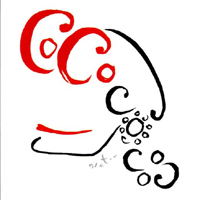 Original Broadway Cast, 1969 (ABC-Paramount/MCA)
Original Broadway Cast, 1969 (ABC-Paramount/MCA)  (1 / 5) It’s terrible, fascinating, and possibly the most unreviewable of all cast recordings. Alan Jay Lerner cooked up this musical bio of Coco Chanel and somehow got Katharine Hepburn to star. The result is a camp hoot as viewed from many different angles. Hepburn’s singing makes Lauren Bacall sound like Joan Sutherland; she ends up in a statistical dead heat with Bette Davis for the title of least vocally qualified star in Broadway musical history. Just listen to her gamely navigate Lerner’s tongue-twisting lyrics (“Should I drive myself to drink / For some ruffians who think / That chic is someone riding on a camel?”) while a drumbeat struggles to keep her in some kind of rhythm. Furthermore, the show is a museum of dated social attitudes: Lerner constantly raps Chanel on the knuckles for putting a career before love, and much of the action focuses on Coco’s pathetic attraction to a young model, Noelle, whom she views as a surrogate daughter. (As Noelle’s boyfriend points out, “To me this emporium / Is sex in memoriam / Where feelings are frozen / And face lotion flows in your veins.”) Furthermore, Chanel’s nemesis is Sebastian (René Auberjonois), a screaming queen of a dress designer described in the original liner notes as “almost male, almost female, almost human.” His number “Fiasco,” in which he hyperventilates in triumph over Coco’s flop showing, is best described as grisly. And yet — André Previn’s music is jazzy, impudent, and often gorgeously romantic in the style of his years at MGM; Lerner’s lyrics have much of his old urbanity; and Hepburn’s star power burns through everything. You’ve got to hear this album once, even if you never want to hear it again. — David Barbour
(1 / 5) It’s terrible, fascinating, and possibly the most unreviewable of all cast recordings. Alan Jay Lerner cooked up this musical bio of Coco Chanel and somehow got Katharine Hepburn to star. The result is a camp hoot as viewed from many different angles. Hepburn’s singing makes Lauren Bacall sound like Joan Sutherland; she ends up in a statistical dead heat with Bette Davis for the title of least vocally qualified star in Broadway musical history. Just listen to her gamely navigate Lerner’s tongue-twisting lyrics (“Should I drive myself to drink / For some ruffians who think / That chic is someone riding on a camel?”) while a drumbeat struggles to keep her in some kind of rhythm. Furthermore, the show is a museum of dated social attitudes: Lerner constantly raps Chanel on the knuckles for putting a career before love, and much of the action focuses on Coco’s pathetic attraction to a young model, Noelle, whom she views as a surrogate daughter. (As Noelle’s boyfriend points out, “To me this emporium / Is sex in memoriam / Where feelings are frozen / And face lotion flows in your veins.”) Furthermore, Chanel’s nemesis is Sebastian (René Auberjonois), a screaming queen of a dress designer described in the original liner notes as “almost male, almost female, almost human.” His number “Fiasco,” in which he hyperventilates in triumph over Coco’s flop showing, is best described as grisly. And yet — André Previn’s music is jazzy, impudent, and often gorgeously romantic in the style of his years at MGM; Lerner’s lyrics have much of his old urbanity; and Hepburn’s star power burns through everything. You’ve got to hear this album once, even if you never want to hear it again. — David Barbour
Monthly Archives: February 2015
Closer Than Ever
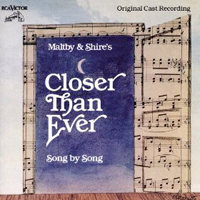 Original Off-Broadway Cast, 1989 (RCA, 2CDs)
Original Off-Broadway Cast, 1989 (RCA, 2CDs)  (4 / 5) To one set of critics, this four-person revue of songs by composer David Shire and lyricist Richard Maltby, Jr. was a long-overdue outpouring of material from a gifted, underappreciated team; to another, it was largely an evening of self-involved, spoiled yuppies whining in song. Both viewpoints are correct. The two dozen numbers on this double-CD set, representing the entire show, are impeccably crafted, with music and lyrics that are melodic, intelligent, humorous, and reflective. But many of the characters that sing them are unappealing: well-off, urban thirtysomethings yammering yards of pentameter about health crazes, Muzak, and personal discovery. So while there’s some first-rate stuff here — “Miss Byrd,” “One of the Good Guys,” “The Bear, the Tiger, the Hamster, and the Mole,” each the equivalent of a self-contained, one-act play — there are also such odes to emotional self-indulgence as “Next Time,” “I Wouldn’t Go Back,” and “Like a Baby.” Uneven as the musical program is, there’s a saving grace in that this is one of the best-sung cast albums of the ’80s. Brent Barrett, at the peak of his powers, puts over even the second-tier songs with assurance and thrilling high notes. Sally Mayes’ natural warmth and comedic skill shine in “You Want to Be My Friend?” and “Back on Base.” The prodigiously talented Lynne Wintersteller’s “Life Story” is one of the most affecting show-tune tracks of the ’80s. Even Richard Muenz, normally a ham, keeps his preening in check until the heavy-breathing “If I Sing.” The cast is also splendid collectively — hear how gorgeously they harmonize in “She Loves Me Not” — and the album’s arrangements, augmented from the stage production to include a swinging combo, lend color. Closer Than Ever may have lacked the sense of discovery that marked the earlier Maltby-Shire revue Starting Here, Starting Now, but as a recording, it’s consistently better sung. — Marc Miller
(4 / 5) To one set of critics, this four-person revue of songs by composer David Shire and lyricist Richard Maltby, Jr. was a long-overdue outpouring of material from a gifted, underappreciated team; to another, it was largely an evening of self-involved, spoiled yuppies whining in song. Both viewpoints are correct. The two dozen numbers on this double-CD set, representing the entire show, are impeccably crafted, with music and lyrics that are melodic, intelligent, humorous, and reflective. But many of the characters that sing them are unappealing: well-off, urban thirtysomethings yammering yards of pentameter about health crazes, Muzak, and personal discovery. So while there’s some first-rate stuff here — “Miss Byrd,” “One of the Good Guys,” “The Bear, the Tiger, the Hamster, and the Mole,” each the equivalent of a self-contained, one-act play — there are also such odes to emotional self-indulgence as “Next Time,” “I Wouldn’t Go Back,” and “Like a Baby.” Uneven as the musical program is, there’s a saving grace in that this is one of the best-sung cast albums of the ’80s. Brent Barrett, at the peak of his powers, puts over even the second-tier songs with assurance and thrilling high notes. Sally Mayes’ natural warmth and comedic skill shine in “You Want to Be My Friend?” and “Back on Base.” The prodigiously talented Lynne Wintersteller’s “Life Story” is one of the most affecting show-tune tracks of the ’80s. Even Richard Muenz, normally a ham, keeps his preening in check until the heavy-breathing “If I Sing.” The cast is also splendid collectively — hear how gorgeously they harmonize in “She Loves Me Not” — and the album’s arrangements, augmented from the stage production to include a swinging combo, lend color. Closer Than Ever may have lacked the sense of discovery that marked the earlier Maltby-Shire revue Starting Here, Starting Now, but as a recording, it’s consistently better sung. — Marc Miller
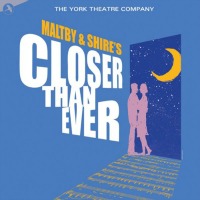 Off-Broadway Cast, 2012 (JAY, 2CDs)
Off-Broadway Cast, 2012 (JAY, 2CDs)  (4 / 5) The York Theatre Company revived Closer Than Ever in 2012, and the run of the show kept being extended, a hopeful sign that some theatergoers still have taste. The four vocalists — Jenn Colella, George Dvorsky, Christiane Noll, and Sal Viviano — are accomplished pros all, and Colella in particular pours a lot of feeling into everything she sings. But you may miss Lynne Wintersteller’s elegance and Brent Barrett’s high notes, and you’ll probably miss the other version’s orchestrations, here reduced to piano, bass, and drums. On the bonus side, we get two new Maltby-Shire songs. “There Is Something in a Wedding” feels schmaltzy coming from this duo, but “Dating Again,” the plaint of middle-aged singles diving back into the dating pool, is wry and wonderful. I’d go with the 1989 album if I could have only one, but there’s plenty of pleasure here as well. And the best of the songs hold up beautifully, with lyrics discreetly updated in spots. –– M.M.
(4 / 5) The York Theatre Company revived Closer Than Ever in 2012, and the run of the show kept being extended, a hopeful sign that some theatergoers still have taste. The four vocalists — Jenn Colella, George Dvorsky, Christiane Noll, and Sal Viviano — are accomplished pros all, and Colella in particular pours a lot of feeling into everything she sings. But you may miss Lynne Wintersteller’s elegance and Brent Barrett’s high notes, and you’ll probably miss the other version’s orchestrations, here reduced to piano, bass, and drums. On the bonus side, we get two new Maltby-Shire songs. “There Is Something in a Wedding” feels schmaltzy coming from this duo, but “Dating Again,” the plaint of middle-aged singles diving back into the dating pool, is wry and wonderful. I’d go with the 1989 album if I could have only one, but there’s plenty of pleasure here as well. And the best of the songs hold up beautifully, with lyrics discreetly updated in spots. –– M.M.
.
Cinderella (Rodgers & Hammerstein)
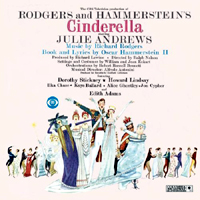 Original Television Cast, 1957 (Columbia)
Original Television Cast, 1957 (Columbia)  (5 / 5) In the age of television’s big-cast, major-hoopla “spectaculars,” one program stood out as a truly gala event: Rodgers and Harnmerstein’s Cinderella, starring Julie Andrews. Forget the Fairy Godmother; here, the magic was in the score and the star. Broadcast on March 31, 1957, Cinderella still stands as one of the most-watched programs in television history. Those were the days of live TV (the show survives in a kinescope, later released to home video) and of quick turnover for cast albums; this LP was actually in stores six days prior to the telecast! R&H’s Cinderella may not be their greatest achievement, but the team produced a fine score that is romantic and funny by turns, and the album is wonderful. Naturally, Andrews dominates. Wistful when singing “In My Own Little Corner,” rapturous in “A Lovely Night,” this great star is utterly believable as a fairy tale heroine. Nearly everyone else in the cast is up to her level, with only Jon Cypher as the Prince seeming a tad out of his league. Kaye Ballard and Alice Ghostley are very funny as the stepsisters — not hateful, just buffoonish in an endearing way. Dorothy Stickney and Howard Lindsay are sweet as the King and Queen, and Edith (Edie) Adams is a Fairy Godmother almost as young and charming as her cinder-smudged charge. Listening to this souvenir of a long-vanished era of TV entertainment, you think: “It really hasn’t gotten better, has it?” — Richard Barrios
(5 / 5) In the age of television’s big-cast, major-hoopla “spectaculars,” one program stood out as a truly gala event: Rodgers and Harnmerstein’s Cinderella, starring Julie Andrews. Forget the Fairy Godmother; here, the magic was in the score and the star. Broadcast on March 31, 1957, Cinderella still stands as one of the most-watched programs in television history. Those were the days of live TV (the show survives in a kinescope, later released to home video) and of quick turnover for cast albums; this LP was actually in stores six days prior to the telecast! R&H’s Cinderella may not be their greatest achievement, but the team produced a fine score that is romantic and funny by turns, and the album is wonderful. Naturally, Andrews dominates. Wistful when singing “In My Own Little Corner,” rapturous in “A Lovely Night,” this great star is utterly believable as a fairy tale heroine. Nearly everyone else in the cast is up to her level, with only Jon Cypher as the Prince seeming a tad out of his league. Kaye Ballard and Alice Ghostley are very funny as the stepsisters — not hateful, just buffoonish in an endearing way. Dorothy Stickney and Howard Lindsay are sweet as the King and Queen, and Edith (Edie) Adams is a Fairy Godmother almost as young and charming as her cinder-smudged charge. Listening to this souvenir of a long-vanished era of TV entertainment, you think: “It really hasn’t gotten better, has it?” — Richard Barrios
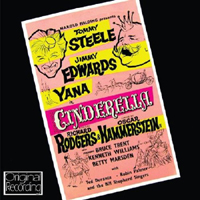 Original London Cast, 1958 (Decca/Bayview)
Original London Cast, 1958 (Decca/Bayview)  (2 / 5) Although it was written for television, Cinderella soon found its way onto the stage in productions that were usually fleshed-out with additional material, as in this recording. Rodgers and Hammerstein normally kept close tabs on major foreign productions of their work, but in this exceptional case, the property was sold outright for a Christmas pantomime at the London Palladium. A beloved British tradition, the “panto” format was pretty much set in stone — a star comedian, special music-hall material, comic drag — and all shows had to conform. Oddly enough, a version of the Cinderella story had been presented at the Palladium some years earlier, with the title role played by –Julie Andrews. (That was before she became famous as Eliza Doolittle in My Fair Lady.) But here, the star was the young Tommy Steele in a role that R&H never dreamed of: Buttons, a servant with a thick Cockney accent. The added songs are English-music-hall pop. While all of these changes diminish the heroine’s role, Cinderella still fares pretty well as performed by Yana, a British pop singer and TV personality of the time. As the prince, Bruce Trent is given an additional R&H gem, “No Other Love” — a song from the Broadway show Me and Juliet, with a melody Rodgers originally composed for Victory at Sea, a TV documentary about naval combat during World War II! There are other changes here and there but, fortunately, the drag stepsisters are not as campy as might have been feared. All in all, the recording is a curiosity at least, and sometimes more. — R.B.
(2 / 5) Although it was written for television, Cinderella soon found its way onto the stage in productions that were usually fleshed-out with additional material, as in this recording. Rodgers and Hammerstein normally kept close tabs on major foreign productions of their work, but in this exceptional case, the property was sold outright for a Christmas pantomime at the London Palladium. A beloved British tradition, the “panto” format was pretty much set in stone — a star comedian, special music-hall material, comic drag — and all shows had to conform. Oddly enough, a version of the Cinderella story had been presented at the Palladium some years earlier, with the title role played by –Julie Andrews. (That was before she became famous as Eliza Doolittle in My Fair Lady.) But here, the star was the young Tommy Steele in a role that R&H never dreamed of: Buttons, a servant with a thick Cockney accent. The added songs are English-music-hall pop. While all of these changes diminish the heroine’s role, Cinderella still fares pretty well as performed by Yana, a British pop singer and TV personality of the time. As the prince, Bruce Trent is given an additional R&H gem, “No Other Love” — a song from the Broadway show Me and Juliet, with a melody Rodgers originally composed for Victory at Sea, a TV documentary about naval combat during World War II! There are other changes here and there but, fortunately, the drag stepsisters are not as campy as might have been feared. All in all, the recording is a curiosity at least, and sometimes more. — R.B.
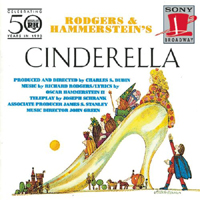 Television Cast, 1965 (Columbia)
Television Cast, 1965 (Columbia)  (1 / 5) The 1957 Cinderella telecast was a tremendous success, but since it wasn’t preserved on videotape, it quickly passed into legend. Eight years later, the property was ripe for remake — albeit without Julie Andrews, who was by then a big Hollywood star. Hammerstein had died, and the new production very much reflected the Rodgers-alone aesthetic: extremely “sincere,” no sly winks at the story, the whole of it done with solemnity. Changes such as turning “A Lovely Night” from a quartet into a solo were not improvements, and the interpolated “Loneliness of Evening” (cut from South Pacific) makes the show seem all the more funereal. As Cinderella, teenager Lesley Ann Warren tries to fill some very large glass slippers. While she displays a certain charm, her singing here is thin and uncertain, and she is not yet the assured performer she would later become. Stuart Damon’s prince is well sung but stodgy, and Celeste Holm is a synthetic Fairy Godmother. Only Pat Carroll and Barbara Ruick escape the gloom, but they have less opportunity to shine than did Ballard and Ghostley. Despite its inadequacies, the show was rerun numerous times. (In 1997, another TV version aired, with a cast headed by singer Brandy, Paolo Montalban, Bernadette Peters, Whitney Houston, Jason Alexander, Victor Garber, and Whoopi Goldberg. That production was commercially released only on home video, not on CD.) — R.B.
(1 / 5) The 1957 Cinderella telecast was a tremendous success, but since it wasn’t preserved on videotape, it quickly passed into legend. Eight years later, the property was ripe for remake — albeit without Julie Andrews, who was by then a big Hollywood star. Hammerstein had died, and the new production very much reflected the Rodgers-alone aesthetic: extremely “sincere,” no sly winks at the story, the whole of it done with solemnity. Changes such as turning “A Lovely Night” from a quartet into a solo were not improvements, and the interpolated “Loneliness of Evening” (cut from South Pacific) makes the show seem all the more funereal. As Cinderella, teenager Lesley Ann Warren tries to fill some very large glass slippers. While she displays a certain charm, her singing here is thin and uncertain, and she is not yet the assured performer she would later become. Stuart Damon’s prince is well sung but stodgy, and Celeste Holm is a synthetic Fairy Godmother. Only Pat Carroll and Barbara Ruick escape the gloom, but they have less opportunity to shine than did Ballard and Ghostley. Despite its inadequacies, the show was rerun numerous times. (In 1997, another TV version aired, with a cast headed by singer Brandy, Paolo Montalban, Bernadette Peters, Whitney Houston, Jason Alexander, Victor Garber, and Whoopi Goldberg. That production was commercially released only on home video, not on CD.) — R.B.
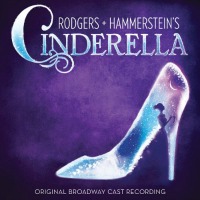 Broadway Cast, 2013 (Ghostlight)
Broadway Cast, 2013 (Ghostlight)  (2 / 5) You can’t keep a good score (or a familiar, beloved story) down. As noted above, Rodgers and Hammerstein’s made-for-TV fairy tale was adapted for the stage within a few years of that first sensational telecast, and numerous productions have followed. The most ambitious effort came with the show’s Broadway premiere in 2013, featuring a new book by Douglas Carter Beane. The King and Queen were omitted (or exiled), Cinderella was given a you-go-girl sense of empowerment, and once again there were songs from elsewhere in the R&H catalogue. (“Loneliness of Evening” came this time with altered lyrics.) The production was heavy on dazzle, the costumes won a Tony, and the show ran on Broadway for two years. Not surprisingly, the main virtue of this recording is the score, add-ons and all. Fortunately, there are some good voices singing it. While Laura Osnes does not always phrase with the utmost grace, her crystalline tone is both attractive and appropriate. Santino Fontana makes an endearing, truly charming prince, while Victoria Clark is luxury casting as the Godmother. Also in the deluxe realm is the marvelous Harriet Harris, though her stepmother doesn’t have much to do on the album. While never challenging Julie Andrews and the rest of the 1957 team, this is still Rodgers and Hammerstein, reasonably well performed — and that puts it well ahead of most of its Broadway competition. — R.B.
(2 / 5) You can’t keep a good score (or a familiar, beloved story) down. As noted above, Rodgers and Hammerstein’s made-for-TV fairy tale was adapted for the stage within a few years of that first sensational telecast, and numerous productions have followed. The most ambitious effort came with the show’s Broadway premiere in 2013, featuring a new book by Douglas Carter Beane. The King and Queen were omitted (or exiled), Cinderella was given a you-go-girl sense of empowerment, and once again there were songs from elsewhere in the R&H catalogue. (“Loneliness of Evening” came this time with altered lyrics.) The production was heavy on dazzle, the costumes won a Tony, and the show ran on Broadway for two years. Not surprisingly, the main virtue of this recording is the score, add-ons and all. Fortunately, there are some good voices singing it. While Laura Osnes does not always phrase with the utmost grace, her crystalline tone is both attractive and appropriate. Santino Fontana makes an endearing, truly charming prince, while Victoria Clark is luxury casting as the Godmother. Also in the deluxe realm is the marvelous Harriet Harris, though her stepmother doesn’t have much to do on the album. While never challenging Julie Andrews and the rest of the 1957 team, this is still Rodgers and Hammerstein, reasonably well performed — and that puts it well ahead of most of its Broadway competition. — R.B.
Chu Chin Chow
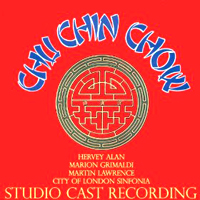 Studio Cast Recordings from the 1960s (Angel)
Studio Cast Recordings from the 1960s (Angel)  (4 / 5) Chu Chin Chow was a huge success on the London stage, where it ran from 1916 to 1921. A Broadway production, which had a shorter run, opened in 1917. Billed as a “Musical Tale of the East,” this was an extravaganza with an ensemble of 64, plus eight children! Chu Chin Chow was “the show to see” for British soldiers on their way to fight in The Great War. The CD combines cuts from two recordings of songs from the score, one from EMI and the other from World Record Club, that were first issued on LP in the late 1950s-early ’60s. EMI gave most of the male vocals to the excellent bass-baritone Inia Te Wiata, and there were new orchestrations by Brian Fahey; World assigned the songs per the show, and used the original arrangements. Frederic Norton’s music is lush and melodic in a quasi-Oriental style, while Oscar Ashe’s lyrics are less inventive, for the most part. Basically the story of “Ali Baba and the Forty Thieves,” with numerous additional plot lines and characters, the show is rather delicious nonsense. Beginning with the stately opening “Here Be Oysters,” the riches keep coming: the elegiac “Cleopatra’s Nile,” the comedic “When a Pullet Is Plump” and “Mahbubah,” the martial “We Are the Robbers of the Woods,” the heart-rending “I Long for the Sun,” and the exuberant “I’Il Sing and Dance,” among others. As a bonus, the CD contains several songs performed by members of the original 1916 cast, plus a couple from the 1934 film soundtrack. These recordings waft us back to a bygone theatrical era the likes of which we may never see or hear again. — Jeffrey Dunn
(4 / 5) Chu Chin Chow was a huge success on the London stage, where it ran from 1916 to 1921. A Broadway production, which had a shorter run, opened in 1917. Billed as a “Musical Tale of the East,” this was an extravaganza with an ensemble of 64, plus eight children! Chu Chin Chow was “the show to see” for British soldiers on their way to fight in The Great War. The CD combines cuts from two recordings of songs from the score, one from EMI and the other from World Record Club, that were first issued on LP in the late 1950s-early ’60s. EMI gave most of the male vocals to the excellent bass-baritone Inia Te Wiata, and there were new orchestrations by Brian Fahey; World assigned the songs per the show, and used the original arrangements. Frederic Norton’s music is lush and melodic in a quasi-Oriental style, while Oscar Ashe’s lyrics are less inventive, for the most part. Basically the story of “Ali Baba and the Forty Thieves,” with numerous additional plot lines and characters, the show is rather delicious nonsense. Beginning with the stately opening “Here Be Oysters,” the riches keep coming: the elegiac “Cleopatra’s Nile,” the comedic “When a Pullet Is Plump” and “Mahbubah,” the martial “We Are the Robbers of the Woods,” the heart-rending “I Long for the Sun,” and the exuberant “I’Il Sing and Dance,” among others. As a bonus, the CD contains several songs performed by members of the original 1916 cast, plus a couple from the 1934 film soundtrack. These recordings waft us back to a bygone theatrical era the likes of which we may never see or hear again. — Jeffrey Dunn
Christine
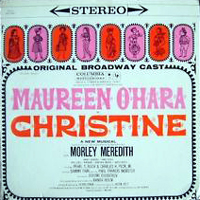 Original Broadway Cast, 1960 (Columbia/DRG) No stars; not recommended. Maureen O’Hara, in her only musical, is Christine FitzSimmons — an Irishwoman who journeys to India and falls in love with her son-in-law, an earnest doctor named Rashil Singh (her daughter is, thankfully, dead), only to realize that they are from Different Worlds. With lyrics like “Why, Shiva, do you desert me?”, this dreary soap operetta sounds like an amateur theatrical staged by the U.N. Security Council. There’s even a “UNICEF Song,” in which a pack of cute Indian tykes sing about the joys of vaccination. Pearl S. Buck and Charles K. Peck, Jr. were the luckless librettists; Paul Francis Webster’s lyrics are given to clunky meditations (“Where is the medicine for sorrow?”), and Sammy Fain’s music sounds like the score of an unreleased Douglas Sirk film. Broadway wise-crackers Nancy Andrews and Phil Leeds, inexplicably cast as Indians, sing a couple of comedy relief numbers about the differences between East and West, and then there’s the indescribable “The Lovely Girls of Akbarabad.” O’Hara’s singing is unexpectedly lovely, and one or two of the melodies are quite nice, but the rest of it is pure curried corn. — David Barbour
Original Broadway Cast, 1960 (Columbia/DRG) No stars; not recommended. Maureen O’Hara, in her only musical, is Christine FitzSimmons — an Irishwoman who journeys to India and falls in love with her son-in-law, an earnest doctor named Rashil Singh (her daughter is, thankfully, dead), only to realize that they are from Different Worlds. With lyrics like “Why, Shiva, do you desert me?”, this dreary soap operetta sounds like an amateur theatrical staged by the U.N. Security Council. There’s even a “UNICEF Song,” in which a pack of cute Indian tykes sing about the joys of vaccination. Pearl S. Buck and Charles K. Peck, Jr. were the luckless librettists; Paul Francis Webster’s lyrics are given to clunky meditations (“Where is the medicine for sorrow?”), and Sammy Fain’s music sounds like the score of an unreleased Douglas Sirk film. Broadway wise-crackers Nancy Andrews and Phil Leeds, inexplicably cast as Indians, sing a couple of comedy relief numbers about the differences between East and West, and then there’s the indescribable “The Lovely Girls of Akbarabad.” O’Hara’s singing is unexpectedly lovely, and one or two of the melodies are quite nice, but the rest of it is pure curried corn. — David Barbour
Chicago
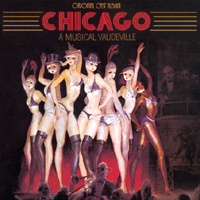 Original Broadway Cast, 1975 (Arista)
Original Broadway Cast, 1975 (Arista)  (5 / 5) Perhaps not fully appreciated during its initial run of only two years in the mid-1970s, the John Kander-Fred Ebb-Bob Fosse musical Chicago is now recognized as a model Broadway show of its kind, thanks in large part to the revivals and the film version noted below. The central role of Roxie Hart would have been a perfect fit for Gwen Verdon in her prime; indeed, Verdon and her frequent collaborator/sometime husband Fosse had been trying to get a Chicago musical off the ground for years before it finally happened. By that time, Verdon was really too old for the role and was having vocal problems that eventually caused her to take a hiatus from the show. (She was replaced, spectacularly, by Liza Minnelli.) Still, despite these handicaps, Verdon brings her notable brand of charisma — which earned her four Tony Awards over an extraordinary career — to Roxie, as heard on this original cast recording. Her partner, Chita Rivera, will always remain the definitive Velma Kelly in the minds of many theatergoers and cast album devotees. Jerry Orbach is ideal as Billy Flynn — smooth in “All I Care About,” sexy in “Razzle Dazzle,” and hilarious in “We Both Reached for the Gun.” M. O’Haughey is a riot as Mary Sunshine and has all of the required high notes, while Barney Martin’s Amos Hart stands up well in comparison with such later, terrific exponents of the role as Joel Grey, Nigel Planer, and John C. Reilly. Ralph Burns’ orchestrations are exemplary, and conductor Stanley Lebowsky does a bang-up job. — Michael Portantiere
(5 / 5) Perhaps not fully appreciated during its initial run of only two years in the mid-1970s, the John Kander-Fred Ebb-Bob Fosse musical Chicago is now recognized as a model Broadway show of its kind, thanks in large part to the revivals and the film version noted below. The central role of Roxie Hart would have been a perfect fit for Gwen Verdon in her prime; indeed, Verdon and her frequent collaborator/sometime husband Fosse had been trying to get a Chicago musical off the ground for years before it finally happened. By that time, Verdon was really too old for the role and was having vocal problems that eventually caused her to take a hiatus from the show. (She was replaced, spectacularly, by Liza Minnelli.) Still, despite these handicaps, Verdon brings her notable brand of charisma — which earned her four Tony Awards over an extraordinary career — to Roxie, as heard on this original cast recording. Her partner, Chita Rivera, will always remain the definitive Velma Kelly in the minds of many theatergoers and cast album devotees. Jerry Orbach is ideal as Billy Flynn — smooth in “All I Care About,” sexy in “Razzle Dazzle,” and hilarious in “We Both Reached for the Gun.” M. O’Haughey is a riot as Mary Sunshine and has all of the required high notes, while Barney Martin’s Amos Hart stands up well in comparison with such later, terrific exponents of the role as Joel Grey, Nigel Planer, and John C. Reilly. Ralph Burns’ orchestrations are exemplary, and conductor Stanley Lebowsky does a bang-up job. — Michael Portantiere
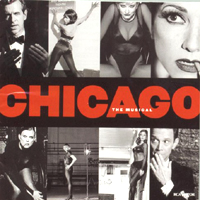 Broadway Cast, 1996 (RCA)
Broadway Cast, 1996 (RCA)  (2 / 5) Here’s a cast album that unfortunately does a disservice to the production it represents. Inspired by a rapturously received City Center Encores! concert version of Chicago, the 1996 Broadway revival was thrilling, largely due to Ann Reinking’s hot-hot-hot choreography in the style of her mentor Bob Fosse. But listening to the recording without the visual component highlights the fact that the vocal performances of all three of the leads are unsatisfying in one way or another. Never famous as a chanteuse, Reinking is in terrible vocal health here as Roxie Hart, sounding so raspy throughout that it almost hurts to hear her. On top of that, her weird mannerisms of pronunciation are distracting; for example, her spoken line “Nobody walks out on me!” sounds like “Nobody walks out on Mae!” Also, it’s clear that the key of “My Own Best Friend” was damagingly lowered for this production and the recording because this Roxie would not have been able to get through the song otherwise. As for Reinking’s co-stars: Although the timbre of James Naughton’s voice is perfect for Billy Flynn, he has some pitch issues, and while Bebe Neuwirth is vocally strong as Velma Kelly, her performance is somewhat lacking in sex appeal and humor. On more positive notes, Marcia Lewis is sassy as Mama Morton, Joel Grey is felicitously cast as Amos Hart, and the band really swings under Rob Fisher. — M.P.
(2 / 5) Here’s a cast album that unfortunately does a disservice to the production it represents. Inspired by a rapturously received City Center Encores! concert version of Chicago, the 1996 Broadway revival was thrilling, largely due to Ann Reinking’s hot-hot-hot choreography in the style of her mentor Bob Fosse. But listening to the recording without the visual component highlights the fact that the vocal performances of all three of the leads are unsatisfying in one way or another. Never famous as a chanteuse, Reinking is in terrible vocal health here as Roxie Hart, sounding so raspy throughout that it almost hurts to hear her. On top of that, her weird mannerisms of pronunciation are distracting; for example, her spoken line “Nobody walks out on me!” sounds like “Nobody walks out on Mae!” Also, it’s clear that the key of “My Own Best Friend” was damagingly lowered for this production and the recording because this Roxie would not have been able to get through the song otherwise. As for Reinking’s co-stars: Although the timbre of James Naughton’s voice is perfect for Billy Flynn, he has some pitch issues, and while Bebe Neuwirth is vocally strong as Velma Kelly, her performance is somewhat lacking in sex appeal and humor. On more positive notes, Marcia Lewis is sassy as Mama Morton, Joel Grey is felicitously cast as Amos Hart, and the band really swings under Rob Fisher. — M.P.
 London Cast, 1998 (RCA)
London Cast, 1998 (RCA)  (4 / 5) This audio memento of the London edition of the City Center Encores!/Broadway Chicago revival is markedly superior to the album reviewed immediately above. In terms of vocal strength, Ruthie Henshall is the most impressive Roxie Hart on records. Many will find the performance of the Roxie-Velma duet “My Own Best Friend” on this album to be the best ever recorded. (Gwen Verdon’s delivery of the song on the original album is tremulous, and the number had to be transposed downward for Ann Reinking to get through it at all in the New York revival.) While Henshall as Roxie and Ute Lemper as Velma are terrific singers, both leading ladies do sound somewhat stilted in their spoken lines, probably because they were working to tone down their thick accents — Henshall’s British and Lemper’s German. Henry Goodman is suavity personified as Billy Flynn, and he sports a decent American accent, as do Meg Johnson (Mama Morton) and Nigel Planer (Amos Hart). C. Shirvell fakes some of the high notes in Mary Sunshine’s “A Little Bit of Good,” but then really knocks one out of the park in the final phrase of the song. The score is conducted by Gareth Valentine with more style than British conductors normally bring to American musicals, perhaps partly because Valentine worked under the supervision of Rob Fisher. — M.P.
(4 / 5) This audio memento of the London edition of the City Center Encores!/Broadway Chicago revival is markedly superior to the album reviewed immediately above. In terms of vocal strength, Ruthie Henshall is the most impressive Roxie Hart on records. Many will find the performance of the Roxie-Velma duet “My Own Best Friend” on this album to be the best ever recorded. (Gwen Verdon’s delivery of the song on the original album is tremulous, and the number had to be transposed downward for Ann Reinking to get through it at all in the New York revival.) While Henshall as Roxie and Ute Lemper as Velma are terrific singers, both leading ladies do sound somewhat stilted in their spoken lines, probably because they were working to tone down their thick accents — Henshall’s British and Lemper’s German. Henry Goodman is suavity personified as Billy Flynn, and he sports a decent American accent, as do Meg Johnson (Mama Morton) and Nigel Planer (Amos Hart). C. Shirvell fakes some of the high notes in Mary Sunshine’s “A Little Bit of Good,” but then really knocks one out of the park in the final phrase of the song. The score is conducted by Gareth Valentine with more style than British conductors normally bring to American musicals, perhaps partly because Valentine worked under the supervision of Rob Fisher. — M.P.
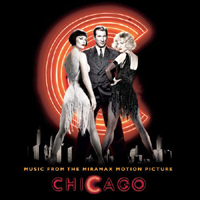 Film Soundtrack, 2002 (Epic)
Film Soundtrack, 2002 (Epic)  (4 / 5) Like the Chicago movie itself, this soundtrack CD is almost too good to be true. Renee Zellweger, who apparently had no real training or experience as a singer (or dancer!) prior to being cast as Roxie by director Rob Marshall, is just right for the part; her sexy, kewpie-doll voice can rise to an impressive belt when she needs it to do so, as at the end of “Funny Honey” and elsewhere. Catherine Zeta-Jones was a musical theater performer in England before becoming a movie star, and is therefore in her element as Velma. (She won an Academy Award for her performance.) Richard Gere, who did a couple of Broadway musicals early in his career, sings with charming artlessness as Billy. John C. Reilly is a fully sympathetic Amos, while Queen Latifah is so well cast as Mama Morton that the role might almost have been written for her. The excision of some of the stage musical’s songs — most notably, “My Own Best Friend” — is regrettable, but what’s here is very well done. And the album does include the Zeta-]ones/Latifah duet “Class,” cut from theatrical release prints of the movie. On top of everything else, Doug Besterman and Larry Blank did a superb job of adapting Ralph Burns’ original orchestrations for the soundtrack. — M.P.
(4 / 5) Like the Chicago movie itself, this soundtrack CD is almost too good to be true. Renee Zellweger, who apparently had no real training or experience as a singer (or dancer!) prior to being cast as Roxie by director Rob Marshall, is just right for the part; her sexy, kewpie-doll voice can rise to an impressive belt when she needs it to do so, as at the end of “Funny Honey” and elsewhere. Catherine Zeta-Jones was a musical theater performer in England before becoming a movie star, and is therefore in her element as Velma. (She won an Academy Award for her performance.) Richard Gere, who did a couple of Broadway musicals early in his career, sings with charming artlessness as Billy. John C. Reilly is a fully sympathetic Amos, while Queen Latifah is so well cast as Mama Morton that the role might almost have been written for her. The excision of some of the stage musical’s songs — most notably, “My Own Best Friend” — is regrettable, but what’s here is very well done. And the album does include the Zeta-]ones/Latifah duet “Class,” cut from theatrical release prints of the movie. On top of everything else, Doug Besterman and Larry Blank did a superb job of adapting Ralph Burns’ original orchestrations for the soundtrack. — M.P.
Children of Eden
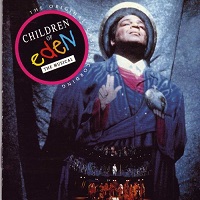 Original London Cast, 1991 (London)
Original London Cast, 1991 (London)  (4 / 5) Because of its biblical subject matter and the sheer volume of music and lyrics that Stephen Schwartz wrote for the piece, including a large amount of choral music, Children of Eden might almost be thought of as an oratorio, except that it does have a fair amount of spoken dialogue. (The book is by John Caird.) Act I tells the story of Adam and Eve, Cain and Abel in the Garden of Eden; Act II is about Noah and family before, during, and after the Ark. Both tales are given a postmodern psychological spin, showing how patterns of familial dysfunction are repeated down through the ages. Highlights of the score include the magnificent opening chorale, “Let There Be,” Eve’s “The Spark of Creation,” and the lovely title song. Children of Eden was originally developed as a workshop production of the Royal Shakespeare Company, directed by Caird and with a cast including Ken Page as Father (i.e., God), Martin Smith as Adam, Shezwae Powell as Eve, Adrian Beaumont as Cain, Francis Ruffelle as Yonah, and Ruthie Henshall as Aphra. As it turned out, the show opened in the West End at the Prince Edward Theatre in January 1991, receiving largely negative reviews and running only three months. For many years, this cast album was one of the rarest in the catalogue, partly because there were production problems with the CD edition, but fans of the score may now find it available in other formats. The performance is excellent overall, recorded in a rich and exciting acoustic, with top vocal honors going to Page, Powell, and Beaumont. — Michael Portantiere
(4 / 5) Because of its biblical subject matter and the sheer volume of music and lyrics that Stephen Schwartz wrote for the piece, including a large amount of choral music, Children of Eden might almost be thought of as an oratorio, except that it does have a fair amount of spoken dialogue. (The book is by John Caird.) Act I tells the story of Adam and Eve, Cain and Abel in the Garden of Eden; Act II is about Noah and family before, during, and after the Ark. Both tales are given a postmodern psychological spin, showing how patterns of familial dysfunction are repeated down through the ages. Highlights of the score include the magnificent opening chorale, “Let There Be,” Eve’s “The Spark of Creation,” and the lovely title song. Children of Eden was originally developed as a workshop production of the Royal Shakespeare Company, directed by Caird and with a cast including Ken Page as Father (i.e., God), Martin Smith as Adam, Shezwae Powell as Eve, Adrian Beaumont as Cain, Francis Ruffelle as Yonah, and Ruthie Henshall as Aphra. As it turned out, the show opened in the West End at the Prince Edward Theatre in January 1991, receiving largely negative reviews and running only three months. For many years, this cast album was one of the rarest in the catalogue, partly because there were production problems with the CD edition, but fans of the score may now find it available in other formats. The performance is excellent overall, recorded in a rich and exciting acoustic, with top vocal honors going to Page, Powell, and Beaumont. — Michael Portantiere
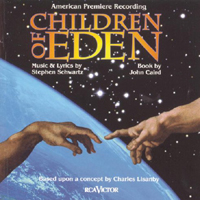 American Premiere Recording, 1998 (RCA, 2CDs)
American Premiere Recording, 1998 (RCA, 2CDs)  (4 / 5) This complete recording of an extensively revised version of Children of Eden is the cast album of a well-received production at the Paper Mill Playhouse in New Jersey. The cast is headed by William Solo as Father, Adrian Zmed as Adam/Noah, Stephanie Mills as Eve/Mama Noah, Darius de Haas as Cain/Japheth, Hunter Foster as Abel/Ham, Vincent D’Elia as Seth/Shem, and Kelli Rabke as Yonah. Throughout the recording, Zmed displays a strong, ringing tenor voice that will come as a pleasant surprise to those who know him primarily as a TV actor (or even from his work in the notorious movie Grease 2, which was not exactly a great showcase for him). And it’s always a tremendous pleasure to hear Mills, best known for originating the role of Dorothy in The Wiz; one only wishes that she had more shows and cast albums to her credit. A major highlight of the recording is de Haas’s intense performance of a vastly improved and much more compelling version of Cain’s “Lost in the Wilderness,” so heavily reworked that, for all intents and purposes, it’s a new song. Rabke does a fine job with the moving “Stranger to the Rain” and duets persuasively with de Haas in another beautiful song, “In Whatever Time We Have.” To date, Children of Eden has not had a commercial staging on or off Broadway in New York City, but it was given a fine benefit concert performance at Riverside Church in 2003. –– M.P.
(4 / 5) This complete recording of an extensively revised version of Children of Eden is the cast album of a well-received production at the Paper Mill Playhouse in New Jersey. The cast is headed by William Solo as Father, Adrian Zmed as Adam/Noah, Stephanie Mills as Eve/Mama Noah, Darius de Haas as Cain/Japheth, Hunter Foster as Abel/Ham, Vincent D’Elia as Seth/Shem, and Kelli Rabke as Yonah. Throughout the recording, Zmed displays a strong, ringing tenor voice that will come as a pleasant surprise to those who know him primarily as a TV actor (or even from his work in the notorious movie Grease 2, which was not exactly a great showcase for him). And it’s always a tremendous pleasure to hear Mills, best known for originating the role of Dorothy in The Wiz; one only wishes that she had more shows and cast albums to her credit. A major highlight of the recording is de Haas’s intense performance of a vastly improved and much more compelling version of Cain’s “Lost in the Wilderness,” so heavily reworked that, for all intents and purposes, it’s a new song. Rabke does a fine job with the moving “Stranger to the Rain” and duets persuasively with de Haas in another beautiful song, “In Whatever Time We Have.” To date, Children of Eden has not had a commercial staging on or off Broadway in New York City, but it was given a fine benefit concert performance at Riverside Church in 2003. –– M.P.
Chess
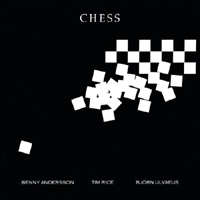 Studio Cast, 1984 (RCA, 2CDs)
Studio Cast, 1984 (RCA, 2CDs)  (5 / 5) Dramatically incoherent but musically brilliant, Chess concerns the fierce rivalry between an American chess champion (here sung by Murray Head) and his Russian opponent (Tommy Körberg), a rivalry complicated by nasty Cold War politics and by the fact that both men become romantically involved with a Hungarian woman named Florence (Elaine Paige). The music is by Benny Andersson and Björn Ulvaeus, who wrote the songs for their mega-famous pop group ABBA; the lyrics are by Tim Rice, best known for his work with Andrew Lloyd Webber. The lyrics as heard on this concept album of Chess are occasionally ungrammatical (“We wish, no must, make our disgust at this abuse perfectly clear”), but there are also many wonderful turns of phrase (“I see my present partner in the imperfect tense”). Frankly, the music is so great that even if the lyrics were not as good as Rice’s, Chess would probably still have gained a huge following. In a score that’s exciting, moving, and witty by turns, highlights include the Russian’s soul-searching “Where I Want to Be” and passionate “Anthem”; the American’s searing “Pity the Child”; and Florence’s angry “Nobody’s Side” and wistful “Heaven Help My Heart.” Also check out the extended “Mountain Duet,” a falling-in-love duet for Florence and the Russian, and “I Know Him So Well,” in which Florence and Svetlana (Barbara Dickson), the Russian’s wife, commiserate. The performances of Körberg and Paige have never been surpassed, and if Head tends to scream more than sing at the top of his range, that’s not inappropriate to the character he portrays. The other two soloists on the recording are Denis Quilley (a round-toned Molokov) and Bjorn Skiffs (a sexy Arbiter). As conducted by Anders Eljas, who also provides terrific orchestrations, the London Symphony Orchestra and The Ambrosian Singers sound magnificent. The recording level of the original CD transfer of this performance was unusually low, but happily, that has been remedied for the most recent release. — Michael Portantiere
(5 / 5) Dramatically incoherent but musically brilliant, Chess concerns the fierce rivalry between an American chess champion (here sung by Murray Head) and his Russian opponent (Tommy Körberg), a rivalry complicated by nasty Cold War politics and by the fact that both men become romantically involved with a Hungarian woman named Florence (Elaine Paige). The music is by Benny Andersson and Björn Ulvaeus, who wrote the songs for their mega-famous pop group ABBA; the lyrics are by Tim Rice, best known for his work with Andrew Lloyd Webber. The lyrics as heard on this concept album of Chess are occasionally ungrammatical (“We wish, no must, make our disgust at this abuse perfectly clear”), but there are also many wonderful turns of phrase (“I see my present partner in the imperfect tense”). Frankly, the music is so great that even if the lyrics were not as good as Rice’s, Chess would probably still have gained a huge following. In a score that’s exciting, moving, and witty by turns, highlights include the Russian’s soul-searching “Where I Want to Be” and passionate “Anthem”; the American’s searing “Pity the Child”; and Florence’s angry “Nobody’s Side” and wistful “Heaven Help My Heart.” Also check out the extended “Mountain Duet,” a falling-in-love duet for Florence and the Russian, and “I Know Him So Well,” in which Florence and Svetlana (Barbara Dickson), the Russian’s wife, commiserate. The performances of Körberg and Paige have never been surpassed, and if Head tends to scream more than sing at the top of his range, that’s not inappropriate to the character he portrays. The other two soloists on the recording are Denis Quilley (a round-toned Molokov) and Bjorn Skiffs (a sexy Arbiter). As conducted by Anders Eljas, who also provides terrific orchestrations, the London Symphony Orchestra and The Ambrosian Singers sound magnificent. The recording level of the original CD transfer of this performance was unusually low, but happily, that has been remedied for the most recent release. — Michael Portantiere
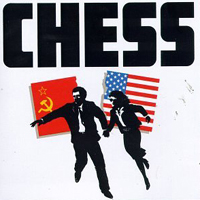 Original Broadway Cast, 1988 (RCA)
Original Broadway Cast, 1988 (RCA)  (3 / 5) It’s generally agreed that Chess flopped on Broadway because of the ineptly crafted book that Richard Nelson wrote around the score in a vain effort to make dramatic sense of it all. Happily, none of his work is included on this recording. Tim Rice reworked his lyrics extensively for the Broadway production, but most of the changes are not improvements. Some songs were added, most notable among them the hauntingly lovely “Someone Else’s Story.” Beautifully sung by Judy Kuhn as Florence, that number alone would justify the purchase of this recording, but there is much more to recommend it. Philip Casnoff as the American chess champ (now named Freddie) is superb; in his amazing performance of the extremely rangy and taxing “Pity the Child,” he maintains full vocal control while not stinting on the song’s outsize emotions. Also, in contrast to Murray Head, Casnoff sounds American (which he is), and that’s important in terms of the plot. The late David Carroll brought a major voice to the role of the Russian champ (now named Anatoly), and his accent is excellent. Overall, this single CD of highlights from the score has its many pleasures, even if it certainly does not supplant the original recording. — M.P.
(3 / 5) It’s generally agreed that Chess flopped on Broadway because of the ineptly crafted book that Richard Nelson wrote around the score in a vain effort to make dramatic sense of it all. Happily, none of his work is included on this recording. Tim Rice reworked his lyrics extensively for the Broadway production, but most of the changes are not improvements. Some songs were added, most notable among them the hauntingly lovely “Someone Else’s Story.” Beautifully sung by Judy Kuhn as Florence, that number alone would justify the purchase of this recording, but there is much more to recommend it. Philip Casnoff as the American chess champ (now named Freddie) is superb; in his amazing performance of the extremely rangy and taxing “Pity the Child,” he maintains full vocal control while not stinting on the song’s outsize emotions. Also, in contrast to Murray Head, Casnoff sounds American (which he is), and that’s important in terms of the plot. The late David Carroll brought a major voice to the role of the Russian champ (now named Anatoly), and his accent is excellent. Overall, this single CD of highlights from the score has its many pleasures, even if it certainly does not supplant the original recording. — M.P.
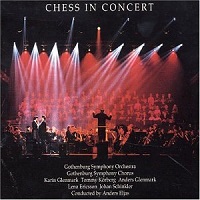 Swedish Concert Cast, 1994 (MONO, 2CDs)
Swedish Concert Cast, 1994 (MONO, 2CDs)  (4 / 5) This album was released in Sweden on Benny Andersson’s label MONO, drawn from concerts that were recorded live at Eriksbergshallen in Gothenburg, Sweden in August 1994, with an all Swedish cast singing in English. A major attraction here is Tommy Körberg returning to the role of the Russian chess master, which he created on the concept album of Chess. If anything, he sounds even better here, equally solid from a vocal standpoint and even more emotionally engaged — perhaps in part because this is a recording of a full concert performance before a live audience, rather than a studio album recorded piecemeal. Married couple Anders and Karin Glenmark, who were background singers on the concept recording, are here promoted to the leading roles of Freddie Trumper and Florence Vassy, and they do very well by their assignments. Anders Eljas, conductor of the original recording, is happily on hand as well, leading the Gothenburg Symphony Orchestra and Chorus plus three band members from ABBA: Rutger Gunnarsson, Lasse Wellander, and Per Lindvall, all of whom also played on the concept album. As of this writing, this recording is out of print and extremely expensive to purchase if you can find it at all, but you might be able to seek out an excerpt or two on YouTube or elsewhere to sample it. — M.P.
(4 / 5) This album was released in Sweden on Benny Andersson’s label MONO, drawn from concerts that were recorded live at Eriksbergshallen in Gothenburg, Sweden in August 1994, with an all Swedish cast singing in English. A major attraction here is Tommy Körberg returning to the role of the Russian chess master, which he created on the concept album of Chess. If anything, he sounds even better here, equally solid from a vocal standpoint and even more emotionally engaged — perhaps in part because this is a recording of a full concert performance before a live audience, rather than a studio album recorded piecemeal. Married couple Anders and Karin Glenmark, who were background singers on the concept recording, are here promoted to the leading roles of Freddie Trumper and Florence Vassy, and they do very well by their assignments. Anders Eljas, conductor of the original recording, is happily on hand as well, leading the Gothenburg Symphony Orchestra and Chorus plus three band members from ABBA: Rutger Gunnarsson, Lasse Wellander, and Per Lindvall, all of whom also played on the concept album. As of this writing, this recording is out of print and extremely expensive to purchase if you can find it at all, but you might be able to seek out an excerpt or two on YouTube or elsewhere to sample it. — M.P.
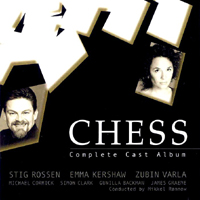 Danish Touring Cast, 2001 (Scanbox, 2CDs)
Danish Touring Cast, 2001 (Scanbox, 2CDs)  (4 / 5) The performance captured here is so fine that this recording would be worth buying even it were less complete. In the role of Anatoly, Stig Rossen sounds a lot like the original, Tommy Körberg — and that’s meant as a great compliment. As Florence, Emma Kershaw may not have quite the voice of her predecessors; still, she’s impressive, especially in the more lyrical sections of the score. (Note that “Someone Else’s Story” is here given to Svetlana, sung persuasively by Gunilla Backman.) The two-disc set contains quite a lot more material than had previously been recorded, but the not-so-great news is that some of the songs are sequenced in a questionable order that apparently more or less replicates their sequencing in the original London stage production of Chess, which did not yield a cast album. For example, the rage-filled “Pity the Child,” powerfully delivered by Zubin Varla, occurs toward the end of Act I rather than in the middle of Act II, thereby making the songs that follow it seem anticlimactic — even Rossen’s heartfelt rendition of “Anthem.” On the plus side, the recording boasts a large orchestra and choir conducted by Mikkel Rennow, and the sound quality is first rate. (Note: Following the initial release of this two-disc set, Andersson and Ulvaeus objected to the recording of some musical sequences without authorization, so they were removed for a subsequent edition.) — M.P.
(4 / 5) The performance captured here is so fine that this recording would be worth buying even it were less complete. In the role of Anatoly, Stig Rossen sounds a lot like the original, Tommy Körberg — and that’s meant as a great compliment. As Florence, Emma Kershaw may not have quite the voice of her predecessors; still, she’s impressive, especially in the more lyrical sections of the score. (Note that “Someone Else’s Story” is here given to Svetlana, sung persuasively by Gunilla Backman.) The two-disc set contains quite a lot more material than had previously been recorded, but the not-so-great news is that some of the songs are sequenced in a questionable order that apparently more or less replicates their sequencing in the original London stage production of Chess, which did not yield a cast album. For example, the rage-filled “Pity the Child,” powerfully delivered by Zubin Varla, occurs toward the end of Act I rather than in the middle of Act II, thereby making the songs that follow it seem anticlimactic — even Rossen’s heartfelt rendition of “Anthem.” On the plus side, the recording boasts a large orchestra and choir conducted by Mikkel Rennow, and the sound quality is first rate. (Note: Following the initial release of this two-disc set, Andersson and Ulvaeus objected to the recording of some musical sequences without authorization, so they were removed for a subsequent edition.) — M.P.
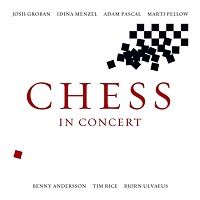 Royal Albert Hall Concert Cast, 2009 (Reprise, 2CDs)
Royal Albert Hall Concert Cast, 2009 (Reprise, 2CDs)  (4 / 5) Fans of Chess can be happy that, even if there has not yet been a completely satisfying presentation of the show as a fully staged musical (or pop opera) with full sets, costumes, etc. — including the original London and Broadway productions — there are several excellent recordings of the score. Presenting the work as a staged concert seems to have become viewed as the wisest choice since the failure of the Broadway production, and this live recording is an audio document of one of the best efforts in that form. Josh Groban and Adam Pascal had previously proven to be pretty much ideal in the roles of the Russian and American chess champs Anatoly Sergievsky and Frederick Trumper in a benefit concert of Chess for The Actors’ Fund of America that was presented on Broadway as a one-night-only event in 2003, and here they reprise those roles in triumph, both perfectly cast in terms of vocal timbre and personality. The male leads are joined by Idina Menzel as Florence Vassy, and even those who are not usually enamored of Menzel’s nasal style of vocal production may feel that this role is a very good fit for her; to these ears, she sounds equally good in the ballads and the more rock-belty sections of the score. Marti Pellow’s singing of the Arbiter’s song is a little too mellow of tone for that intense character, but David Bedella and Clarke Peters are both very strong as Molokov and Walter De Courcy, and Kerry Ellis sounds lovely as Svetlana, who gets to sing “Someone Else’s Story.” There is some new or unfamiliar material here, and the song order isn’t quite the same as any previous production or recording — but Chess enthusiasts should be used to that by now. The very large chorus and orchestra perform excitingly and impeccably under conductor and musical advisor David Firman. (Note: This performance is also available on video, which may be purchased as a DVD along with the 2CD set, or separately.) — M.P.
(4 / 5) Fans of Chess can be happy that, even if there has not yet been a completely satisfying presentation of the show as a fully staged musical (or pop opera) with full sets, costumes, etc. — including the original London and Broadway productions — there are several excellent recordings of the score. Presenting the work as a staged concert seems to have become viewed as the wisest choice since the failure of the Broadway production, and this live recording is an audio document of one of the best efforts in that form. Josh Groban and Adam Pascal had previously proven to be pretty much ideal in the roles of the Russian and American chess champs Anatoly Sergievsky and Frederick Trumper in a benefit concert of Chess for The Actors’ Fund of America that was presented on Broadway as a one-night-only event in 2003, and here they reprise those roles in triumph, both perfectly cast in terms of vocal timbre and personality. The male leads are joined by Idina Menzel as Florence Vassy, and even those who are not usually enamored of Menzel’s nasal style of vocal production may feel that this role is a very good fit for her; to these ears, she sounds equally good in the ballads and the more rock-belty sections of the score. Marti Pellow’s singing of the Arbiter’s song is a little too mellow of tone for that intense character, but David Bedella and Clarke Peters are both very strong as Molokov and Walter De Courcy, and Kerry Ellis sounds lovely as Svetlana, who gets to sing “Someone Else’s Story.” There is some new or unfamiliar material here, and the song order isn’t quite the same as any previous production or recording — but Chess enthusiasts should be used to that by now. The very large chorus and orchestra perform excitingly and impeccably under conductor and musical advisor David Firman. (Note: This performance is also available on video, which may be purchased as a DVD along with the 2CD set, or separately.) — M.P.
Charlotte Sweet
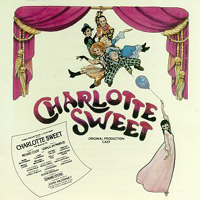 Original Off-Broadway Cast, 1983 (John Hammond Records/DRG)
Original Off-Broadway Cast, 1983 (John Hammond Records/DRG)  (2 / 5) I find librettist Michael Colby to be extremely talented, with more natural gifts as a lyricist. (His shows are through-sung.) Here set to music by Gerald Jay Markoe, Colby’s lyrics are clever, carefully rhymed, and properly accented. But, invariably, 20 minutes into each of Colby’s shows, I want to wring his neck. The plotting of his musicals is always silly and goes too far, leaving amusement behind. In effect, his cleverness calls repeated attention to itself, which becomes tiresome. Charlotte Sweet is a musical about a young woman whose mother, “a chronic shiverer,” has smothered under the many “Layers of Underwear” (song title) that it took to try to warm her up. Paying for all that underwear has put the family in debt to the unbelievably evil Barnaby Bugaboo, who loves Charlotte and who runs a music-hall show filled with singing schizophrenics and lunatics. Charlotte has a freakishly high voice, and Barnaby agrees to cancel the family’s debt if she will join his Circus of Voices. She does so. Eventually, Barnaby destroys her voice, and then he addicts her to balloons filled with helium so that she can still hit the high notes. All kinds of people dress up as other people and, at the end, just about all the characters are killed before it’s revealed that they weren’t really (killed, that is). Clever isn’t enough for this kind of writing; you have to be actually funny, which is a very different thing and which, I’m afraid, Charlotte Sweet isn’t. — David Wolf
(2 / 5) I find librettist Michael Colby to be extremely talented, with more natural gifts as a lyricist. (His shows are through-sung.) Here set to music by Gerald Jay Markoe, Colby’s lyrics are clever, carefully rhymed, and properly accented. But, invariably, 20 minutes into each of Colby’s shows, I want to wring his neck. The plotting of his musicals is always silly and goes too far, leaving amusement behind. In effect, his cleverness calls repeated attention to itself, which becomes tiresome. Charlotte Sweet is a musical about a young woman whose mother, “a chronic shiverer,” has smothered under the many “Layers of Underwear” (song title) that it took to try to warm her up. Paying for all that underwear has put the family in debt to the unbelievably evil Barnaby Bugaboo, who loves Charlotte and who runs a music-hall show filled with singing schizophrenics and lunatics. Charlotte has a freakishly high voice, and Barnaby agrees to cancel the family’s debt if she will join his Circus of Voices. She does so. Eventually, Barnaby destroys her voice, and then he addicts her to balloons filled with helium so that she can still hit the high notes. All kinds of people dress up as other people and, at the end, just about all the characters are killed before it’s revealed that they weren’t really (killed, that is). Clever isn’t enough for this kind of writing; you have to be actually funny, which is a very different thing and which, I’m afraid, Charlotte Sweet isn’t. — David Wolf
Celebration
 Original Broadway Cast, 1969 (Capitol/Angel)
Original Broadway Cast, 1969 (Capitol/Angel)  (1 / 5) The hero and heroine are called Orphan and Angel. The villain is a bloated millionaire named Edgar Allen Rich. The production was designed to resemble a workshop. Its title notwithstanding, Celebration is nothing to celebrate; indeed, it’s one of Tom Jones and Harvey Schmidt’s less successful experiments. Taking its structure “from an. ancient Sumerian ritual play,” and with an underlying theme of the passing of the seasons, Celebration is a flower-power fable pitting youth and goodness against wealth and experience. As reviewer Walter Kerr put it, “I’m surprised the over-50s in the house didn’t retire as a group to the lobby and shoot themselves.” Michael Glenn-Smith is Orphan, who wants the grasping Mr. Rich (Ted Thurston) to give him a garden. Rich manufactures all things artificial — flowers, fruit, foundation garments — and is only interested in having his way with the winsome Angel, played by a somewhat earthier-than-usual Susan Watson. The show starts off strongly with the percussive title number, sung by master-of-ceremonies Keith Charles, and Glenn-Smith scores with his first number, “Orphan in the Storm.” JimTyler’s orchestrations are fairly inventive throughout. But Jones’ narrative is too predictable, and the songs quickly wear out their welcome. This recording belongs in a time capsule. — David Barbour
(1 / 5) The hero and heroine are called Orphan and Angel. The villain is a bloated millionaire named Edgar Allen Rich. The production was designed to resemble a workshop. Its title notwithstanding, Celebration is nothing to celebrate; indeed, it’s one of Tom Jones and Harvey Schmidt’s less successful experiments. Taking its structure “from an. ancient Sumerian ritual play,” and with an underlying theme of the passing of the seasons, Celebration is a flower-power fable pitting youth and goodness against wealth and experience. As reviewer Walter Kerr put it, “I’m surprised the over-50s in the house didn’t retire as a group to the lobby and shoot themselves.” Michael Glenn-Smith is Orphan, who wants the grasping Mr. Rich (Ted Thurston) to give him a garden. Rich manufactures all things artificial — flowers, fruit, foundation garments — and is only interested in having his way with the winsome Angel, played by a somewhat earthier-than-usual Susan Watson. The show starts off strongly with the percussive title number, sung by master-of-ceremonies Keith Charles, and Glenn-Smith scores with his first number, “Orphan in the Storm.” JimTyler’s orchestrations are fairly inventive throughout. But Jones’ narrative is too predictable, and the songs quickly wear out their welcome. This recording belongs in a time capsule. — David Barbour
Carousel
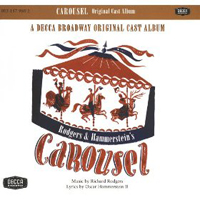 Original Broadway Cast, 1945 (Decca)
Original Broadway Cast, 1945 (Decca)  (4 / 5) This landmark musical is not the most popular of the Rodgers and Hammerstein canon in terms of the number of productions, but it may well be the most beloved and respected. A dramatic musical fantasy that ponders the power of love lasting beyond death, the show is said to have been the favorite of its composer, Richard Rodgers. Indeed, this is one of the most melodic and dramatic scores ever created for the musical theater, including opera, comprising such now-classic songs as “If I Loved You,” “June Is Bustin’ Out All Over,” “When the Children Are Asleep,” “What’s the Use of Wond’rin,” Billy Bigelow’s “Soliloquy,” and the beautiful anthem “You’ll Never Walk Alone.” Oscar Hammerstein’s lyrics are equally rich as Rodgers’ melodies and harmonies. Therefore, any competent recording of Carousel reaches the stratosphere of musical delight. The original Broadway cast album was released on 78-rpm records and is heavily truncated; it’s also an antique in some ways, including sound quality, as compared with subsequent efforts that capture the beauty and passion of the musical far more successfully. What this recording does have to offer is the powerful, spine-tingling vocal performances of the very first Billy Bigelow and Julie Jordan: John Raitt and Jan Clayton. Although Raitt’s later recording of the score (reviewed below) has advantages over this one, his original performance is definitive. Some of the other singers of principal roles — Jean Darling as Carrie, Eric Mattson as Mr. Snow, Christine Johnson as Nettie Fowler, and Murvyn Vye as Jigger Craigin — sound a bit arch, and some of the tempi are rushed. Still, this is an invaluable time capsule that deserves a place of honor in any Broadway show album collection. — Gerard Alessandrini
(4 / 5) This landmark musical is not the most popular of the Rodgers and Hammerstein canon in terms of the number of productions, but it may well be the most beloved and respected. A dramatic musical fantasy that ponders the power of love lasting beyond death, the show is said to have been the favorite of its composer, Richard Rodgers. Indeed, this is one of the most melodic and dramatic scores ever created for the musical theater, including opera, comprising such now-classic songs as “If I Loved You,” “June Is Bustin’ Out All Over,” “When the Children Are Asleep,” “What’s the Use of Wond’rin,” Billy Bigelow’s “Soliloquy,” and the beautiful anthem “You’ll Never Walk Alone.” Oscar Hammerstein’s lyrics are equally rich as Rodgers’ melodies and harmonies. Therefore, any competent recording of Carousel reaches the stratosphere of musical delight. The original Broadway cast album was released on 78-rpm records and is heavily truncated; it’s also an antique in some ways, including sound quality, as compared with subsequent efforts that capture the beauty and passion of the musical far more successfully. What this recording does have to offer is the powerful, spine-tingling vocal performances of the very first Billy Bigelow and Julie Jordan: John Raitt and Jan Clayton. Although Raitt’s later recording of the score (reviewed below) has advantages over this one, his original performance is definitive. Some of the other singers of principal roles — Jean Darling as Carrie, Eric Mattson as Mr. Snow, Christine Johnson as Nettie Fowler, and Murvyn Vye as Jigger Craigin — sound a bit arch, and some of the tempi are rushed. Still, this is an invaluable time capsule that deserves a place of honor in any Broadway show album collection. — Gerard Alessandrini
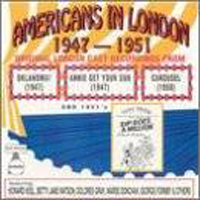 Original London Cast, 1950 (Columbia/Encore)
Original London Cast, 1950 (Columbia/Encore)  (4 / 5) The few recordings of songs from Carousel that were made by the original London cast add up to only about 16 minutes of music. Billy Bigelow is sung by Stephen Douglass, who went on to a successful career on Broadway, starring in Damn Yankees and other shows. He sounds wonderful here, and so does Iva Withers as Julie Jordan. Although both are a bit mannered in style, their beautiful voices lend much to the great Rodgers and Hammerstein songs. Too bad that more of the score wasn’t recorded in those long-ago London sessions. (Note: the Encore label CD release of these recordings, pictured here, also includes excerpts from Oklahoma! and Annie Get Your Gun with members of the original London casts.) — G.A.
(4 / 5) The few recordings of songs from Carousel that were made by the original London cast add up to only about 16 minutes of music. Billy Bigelow is sung by Stephen Douglass, who went on to a successful career on Broadway, starring in Damn Yankees and other shows. He sounds wonderful here, and so does Iva Withers as Julie Jordan. Although both are a bit mannered in style, their beautiful voices lend much to the great Rodgers and Hammerstein songs. Too bad that more of the score wasn’t recorded in those long-ago London sessions. (Note: the Encore label CD release of these recordings, pictured here, also includes excerpts from Oklahoma! and Annie Get Your Gun with members of the original London casts.) — G.A.
 Studio Cast, 1956 (RCA)
Studio Cast, 1956 (RCA)  (3 / 5) This recording contains much more music than the original cast album of Carousel, and it captures Don Walker’s orchestrations in excellent hi-fi (but not stereo) sound. Conductor Lehman Engel does a fine job of coaxing theatrical performances from his operatic leads, Robert Merrill and Patrice Munsel, and the young Florence Henderson is in her element as Carrie. Also on hand is George S. Irving as Jigger Craigin. The album was quite satisfactory in its day, and although it has been superseded by subsequent releases, it’s still a joy to listen to in its own right. — G.A.
(3 / 5) This recording contains much more music than the original cast album of Carousel, and it captures Don Walker’s orchestrations in excellent hi-fi (but not stereo) sound. Conductor Lehman Engel does a fine job of coaxing theatrical performances from his operatic leads, Robert Merrill and Patrice Munsel, and the young Florence Henderson is in her element as Carrie. Also on hand is George S. Irving as Jigger Craigin. The album was quite satisfactory in its day, and although it has been superseded by subsequent releases, it’s still a joy to listen to in its own right. — G.A.
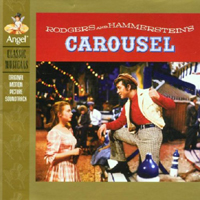 Film Soundtrack, 1956 (CapitolAngel)
Film Soundtrack, 1956 (CapitolAngel)  (5 / 5) This recording achieves the nearly impossible: Can you think of any other Hollywood film soundtrack album that is the definitive version of a great Broadway show score? It features inspired, brilliantly expanded orchestrations by Edmund Powell and the 20th Century Fox scoring department under the supervision of Alfred Newman. The stereophonic sound heard on the remastered CD edition is mostly outstanding. Perfectly cast as the lovers, Gordon MacRae and Shirley Jones deliver Rodgers and Hammerstein’s songs with artistry and unpretentious acting. As in the film soundtrack of Oklahoma! they offer stellar examples of how to perform American musical theater songs; their singing is melodic and strong, yet it sounds like a natural extension of their speaking voices. Among the film’s supporting cast, Robert Rounseville as Mr. Snow and Claramae Turner as Nettie are vocal powerhouses. Barbara Ruick as Carrie and Cameron Mitchell as Jigger are possessed of less”legit”voices, but they give character performances loaded with personality. This album also contains the best-ever recording of the “Carousel Waltz”; under Newman’s direction, it’s a thrilling performance of an arrangement/orchestration that at once elaborates upon, yet remains faithful to, the original. The expanded soundtrack CD includes the songs recorded for the film but not used in the finished release (“Blow High, Blow Low” and “You’re a Queer One, Julie Jordan”) as well as all of the ballet music and the spectacular main title cut, an artfully edited version of the “Carousel Waltz.” If you had to choose only one recording of this magnificent musical to own, this would be it. — G.A.
(5 / 5) This recording achieves the nearly impossible: Can you think of any other Hollywood film soundtrack album that is the definitive version of a great Broadway show score? It features inspired, brilliantly expanded orchestrations by Edmund Powell and the 20th Century Fox scoring department under the supervision of Alfred Newman. The stereophonic sound heard on the remastered CD edition is mostly outstanding. Perfectly cast as the lovers, Gordon MacRae and Shirley Jones deliver Rodgers and Hammerstein’s songs with artistry and unpretentious acting. As in the film soundtrack of Oklahoma! they offer stellar examples of how to perform American musical theater songs; their singing is melodic and strong, yet it sounds like a natural extension of their speaking voices. Among the film’s supporting cast, Robert Rounseville as Mr. Snow and Claramae Turner as Nettie are vocal powerhouses. Barbara Ruick as Carrie and Cameron Mitchell as Jigger are possessed of less”legit”voices, but they give character performances loaded with personality. This album also contains the best-ever recording of the “Carousel Waltz”; under Newman’s direction, it’s a thrilling performance of an arrangement/orchestration that at once elaborates upon, yet remains faithful to, the original. The expanded soundtrack CD includes the songs recorded for the film but not used in the finished release (“Blow High, Blow Low” and “You’re a Queer One, Julie Jordan”) as well as all of the ballet music and the spectacular main title cut, an artfully edited version of the “Carousel Waltz.” If you had to choose only one recording of this magnificent musical to own, this would be it. — G.A.
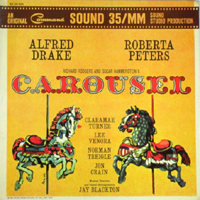 Studio Cast, 1962 (Command/no CD)
Studio Cast, 1962 (Command/no CD)  (2 / 5) What makes this recording notable is the cast. Alfred Drake was the original Curly in Oklahoma! and here proves what a natural he was for the part of Billy Bigelow. Listening to him sing these songs, you might think that he had created the role. Roberta Peters is vocally if not dramatically well suited to Julie Jordan, and none other than Claramae Turner is Nettie, recreating her role from the movie. The gorgeous-voiced Lee Venora is a fine Carrie, and the opera star bass-baritone Norman Treigle is Jigger. Sturdy casting aside, this album offers a re-orchestrated version of the score that stresses stereo effects over musicality; the added xylophones and other excessive percussion seem silly and annoying by today’s standards, and the sound quality of the recording is extremely bright. On the whole, this is sort of a Muzak version of the score and, therefore, a curiosity. — G.A.
(2 / 5) What makes this recording notable is the cast. Alfred Drake was the original Curly in Oklahoma! and here proves what a natural he was for the part of Billy Bigelow. Listening to him sing these songs, you might think that he had created the role. Roberta Peters is vocally if not dramatically well suited to Julie Jordan, and none other than Claramae Turner is Nettie, recreating her role from the movie. The gorgeous-voiced Lee Venora is a fine Carrie, and the opera star bass-baritone Norman Treigle is Jigger. Sturdy casting aside, this album offers a re-orchestrated version of the score that stresses stereo effects over musicality; the added xylophones and other excessive percussion seem silly and annoying by today’s standards, and the sound quality of the recording is extremely bright. On the whole, this is sort of a Muzak version of the score and, therefore, a curiosity. — G.A.
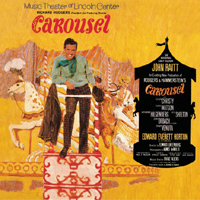 Music Theater of Lincoln Center Cast, 1965 (RCA)
Music Theater of Lincoln Center Cast, 1965 (RCA)  (4 / 5) This first stereophonic stage cast album of Carousel, though skillfully recorded and mixed, lacks the theatricality that a recording drawn from a theatrical production should exhibit. Richard Rodgers himself was the revival’s producer, and we can assume his preferences are reflected here. Impeccably conducted by Franz Allers, the score sounds glorious, and the performances are solid: Eileen Christy is an appealing Julie, Susan Watson a soubrettish Carrie, Reid Shelton a charming Mr. Snow, and the always impressive Jerry Orbach a colorful Jigger. Rounding out the fine cast is Katherine Hilgenburg as Nettie. But what gives this album importance is the fact that is offers “Living Stereo” recordings of Billy Bigelow’s songs as sung by the original Billy, John Raitt. Here, the timbre of Raitt’s voice is different from what is heard on the 1945 album — not better or worse, just different. He sounds more like a tenor, less like a baritone. Some may prefer this interpretation, but the operatic thrill of the original is missing. Still, this is a lovely recording. — G.A.
(4 / 5) This first stereophonic stage cast album of Carousel, though skillfully recorded and mixed, lacks the theatricality that a recording drawn from a theatrical production should exhibit. Richard Rodgers himself was the revival’s producer, and we can assume his preferences are reflected here. Impeccably conducted by Franz Allers, the score sounds glorious, and the performances are solid: Eileen Christy is an appealing Julie, Susan Watson a soubrettish Carrie, Reid Shelton a charming Mr. Snow, and the always impressive Jerry Orbach a colorful Jigger. Rounding out the fine cast is Katherine Hilgenburg as Nettie. But what gives this album importance is the fact that is offers “Living Stereo” recordings of Billy Bigelow’s songs as sung by the original Billy, John Raitt. Here, the timbre of Raitt’s voice is different from what is heard on the 1945 album — not better or worse, just different. He sounds more like a tenor, less like a baritone. Some may prefer this interpretation, but the operatic thrill of the original is missing. Still, this is a lovely recording. — G.A.
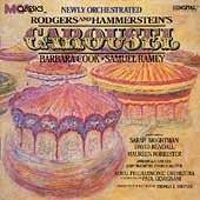 Studio Cast, 1987 (MCA)
Studio Cast, 1987 (MCA)  (3 / 5) In this fairly complete but oddly lackluster recording, Barbara Cook’s phrasing and acting as Julie Jordan are superb, but her rich, mature voice lacks the vulnerability that only a young ingenue can bring to the role. Opera star Samuel Ramey is a full-bodied Billy Bigelow, yet his “legit” sound plays against the more impetuous, youthful facets of the character. Sarah Brightman is quite charming as Carrie. The disc includes the rarely recorded “Geraniums in the Winder,” along with a complete version of”If I Loved You.” “June Is Bustin’ Out All Over” and “You’ll Never Walk Alone” are powerfully sung by Maureen Forrester. Yet, overall, the recording is unexciting. Perhaps that’s partly because the new orchestrations lack theatrical drive, although they are conducted with professionalism and precision by Broadway veteran Paul Gemignani. — G.A.
(3 / 5) In this fairly complete but oddly lackluster recording, Barbara Cook’s phrasing and acting as Julie Jordan are superb, but her rich, mature voice lacks the vulnerability that only a young ingenue can bring to the role. Opera star Samuel Ramey is a full-bodied Billy Bigelow, yet his “legit” sound plays against the more impetuous, youthful facets of the character. Sarah Brightman is quite charming as Carrie. The disc includes the rarely recorded “Geraniums in the Winder,” along with a complete version of”If I Loved You.” “June Is Bustin’ Out All Over” and “You’ll Never Walk Alone” are powerfully sung by Maureen Forrester. Yet, overall, the recording is unexciting. Perhaps that’s partly because the new orchestrations lack theatrical drive, although they are conducted with professionalism and precision by Broadway veteran Paul Gemignani. — G.A.
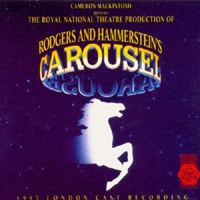 London Cast, 1993 (First Night)
London Cast, 1993 (First Night)  (3 / 5) Director Nicholas Hytner’s imaginative production of Carousel for the Royal National Theatre yielded this cast album. In the role of Billy Bigelow, Michael Hayden sounds pretty much the same here as he does on the recording of the subsequent Lincoln Center Theater production, also directed by Hytner but with an otherwise different cast. Hayden’s colleagues on the London album include Joanna Riding, Meg Johnson, Katrina Murphy, and Clive Rowe. Martin Yates conducts the score with feeling, but many listeners will feel that the 1994 disc reviewed below has supplanted this one if only through greater star power in some of the supporting roles. — G.A.
(3 / 5) Director Nicholas Hytner’s imaginative production of Carousel for the Royal National Theatre yielded this cast album. In the role of Billy Bigelow, Michael Hayden sounds pretty much the same here as he does on the recording of the subsequent Lincoln Center Theater production, also directed by Hytner but with an otherwise different cast. Hayden’s colleagues on the London album include Joanna Riding, Meg Johnson, Katrina Murphy, and Clive Rowe. Martin Yates conducts the score with feeling, but many listeners will feel that the 1994 disc reviewed below has supplanted this one if only through greater star power in some of the supporting roles. — G.A.
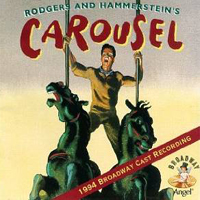 Broadway Cast, 1994 (Angel)
Broadway Cast, 1994 (Angel)  (4 / 5) Here is a stirring aural document of the Lincoln Center Theater production of Carousel. As he had done in London, director Nicholas Hytner proved again that the piece was much more than a quaint folk musical. Audra McDonald was thrust into Tony Award-winning stardom with her performance as Carrie; every nuance of her excellent interpretation is captured on the recording. Sally Murphy makes a fine Julie Jordan, Eddie Korbich is delightful as Mr. Snow, and opera star Shirley Verrett is outstanding as Nettie Fowler. The newish orchestrations are excellent, if not as large as the originals, and all of the choral numbers sound glorious in digital stereo. The star of the show in London and New York was Michael Hayden, who brought solid acting and a vibrant sexuality to the role of Billy Bigelow. Unfortunately, most of that doesn’t translate to the recording, and Hayden’s vocal limitations overshadow his charisma. For that reason alone, this cannot be considered the definitive cast album of Carousel. Still, as a memento of a great production and a fairly complete recording of the score in digital sound, it’s very worthwhile. — G.A.
(4 / 5) Here is a stirring aural document of the Lincoln Center Theater production of Carousel. As he had done in London, director Nicholas Hytner proved again that the piece was much more than a quaint folk musical. Audra McDonald was thrust into Tony Award-winning stardom with her performance as Carrie; every nuance of her excellent interpretation is captured on the recording. Sally Murphy makes a fine Julie Jordan, Eddie Korbich is delightful as Mr. Snow, and opera star Shirley Verrett is outstanding as Nettie Fowler. The newish orchestrations are excellent, if not as large as the originals, and all of the choral numbers sound glorious in digital stereo. The star of the show in London and New York was Michael Hayden, who brought solid acting and a vibrant sexuality to the role of Billy Bigelow. Unfortunately, most of that doesn’t translate to the recording, and Hayden’s vocal limitations overshadow his charisma. For that reason alone, this cannot be considered the definitive cast album of Carousel. Still, as a memento of a great production and a fairly complete recording of the score in digital sound, it’s very worthwhile. — G.A.
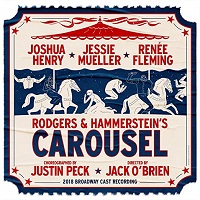 Broadway Cast, 2018 (Craft Recordings)
Broadway Cast, 2018 (Craft Recordings)  (4 / 5) This big Broadway revival of Rodgers and Hammerstein’s most dramatic musical was fairly well received by critics and audiences alike, but it only ran for five months. The recording, however, is a mostly excellent presentation of that version, and will be enjoyed for many years to come. The orchestrations, revised by Jonathan Tunick, are beautifully mixed and sound quite stirring, plus the recording includes much of the thrilling dance music that was heard in the show to accompany its fine new choreography. The vocal stars of the album are Joshua Henry as Billy Bigelow and Jessie Mueller as Julie Jordan; their performances are nearly perfect, coming through with even more vibrancy as recorded than they did in the theater. Also on hand to deliver an excellent and very fresh, Tony Award winning performance is Lindsay Mendez as Carrie Peppridge. Alexander Gemignani as Mr. Snow hits the bullseye vocally and in his fine characterization, but the outstanding performance here is Joshua Henry’s, his superb baritenor voice ringing out loud and clear. In fact, his is the best recorded performance of Billy Bigelow since Gordon Mac Rae and John Raitt. A beautiful soprano from the opera world, Renée Fleming, makes for a stalwart Netttie Fowler in the standards, “June Is Bustin’ Out All Over” and “You’lll Never Walk Alone.” However, the trills and descants she adds to these songs, particularly the finale reprise of the latter, mar the genius of Richard Rodgers’ melodies. Especially since her antics can be heard in the album’s final track, they create a poor last impression on an otherwise highly enjoyable recording. — G.A.
(4 / 5) This big Broadway revival of Rodgers and Hammerstein’s most dramatic musical was fairly well received by critics and audiences alike, but it only ran for five months. The recording, however, is a mostly excellent presentation of that version, and will be enjoyed for many years to come. The orchestrations, revised by Jonathan Tunick, are beautifully mixed and sound quite stirring, plus the recording includes much of the thrilling dance music that was heard in the show to accompany its fine new choreography. The vocal stars of the album are Joshua Henry as Billy Bigelow and Jessie Mueller as Julie Jordan; their performances are nearly perfect, coming through with even more vibrancy as recorded than they did in the theater. Also on hand to deliver an excellent and very fresh, Tony Award winning performance is Lindsay Mendez as Carrie Peppridge. Alexander Gemignani as Mr. Snow hits the bullseye vocally and in his fine characterization, but the outstanding performance here is Joshua Henry’s, his superb baritenor voice ringing out loud and clear. In fact, his is the best recorded performance of Billy Bigelow since Gordon Mac Rae and John Raitt. A beautiful soprano from the opera world, Renée Fleming, makes for a stalwart Netttie Fowler in the standards, “June Is Bustin’ Out All Over” and “You’lll Never Walk Alone.” However, the trills and descants she adds to these songs, particularly the finale reprise of the latter, mar the genius of Richard Rodgers’ melodies. Especially since her antics can be heard in the album’s final track, they create a poor last impression on an otherwise highly enjoyable recording. — G.A.
Carnival
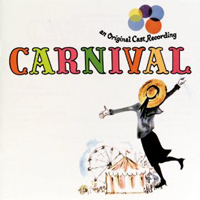 Original Broadway Cast, 1961 (MGM/Polydor)
Original Broadway Cast, 1961 (MGM/Polydor)  (3 / 5) Is there an odder Broadway musical than Carnival? Even with an all-American creative team, its sensibility — alternately sentimental, stark, and raucous — is distinctively French. In Michael Stewart’s book for the musical, based on the film Lili (from a Paul Gallico novella), Anna Maria Alberghetti is the waifish heroine who joins a traveling carnival after the death of her father. She’s dazzled by the philandering magician Marco the Magnificent (James Mitchell), but real love is waiting in the form of Paul (Jerry Orbach), a disabled war vet who has given up dancing to become a puppeteer. Paul can only express his feelings for Lili through his puppets, and the fact that this conceit doesn’t make you scream is a testament to the authors’ skills. Bob Merrill’s melodic score blends whimsical music-box melodies, big dramatic arias, and comedy numbers into a surprisingly persuasive whole. He effectively dramatizes Lili’s vulnerability (“Mira”) and wonderment at the marvels of the carnival (“Yes, My Heart”) as well as Paul’s inner torment(“Everybody Likes You,” “Her Face”), while also making room for broadly farcical songs like “Humming” and “Always, Always You” for Mitchell and Kaye Ballard as his jealous girlfriend. The show’s most famous song, “Love Makes the World Go Round,” is a haunting little tune. Merrill, who spent much of his career working on flops or serving as Jule Styne’s lyricist, was an underrated talent, as this unique, often wrenching piece reveals. A large set of CD bonus tracks includes the composer delivering demo versions of five numbers, plus four pop covers by, among others, Richard Chamberlain and Mel Tormé. — David Barbour
(3 / 5) Is there an odder Broadway musical than Carnival? Even with an all-American creative team, its sensibility — alternately sentimental, stark, and raucous — is distinctively French. In Michael Stewart’s book for the musical, based on the film Lili (from a Paul Gallico novella), Anna Maria Alberghetti is the waifish heroine who joins a traveling carnival after the death of her father. She’s dazzled by the philandering magician Marco the Magnificent (James Mitchell), but real love is waiting in the form of Paul (Jerry Orbach), a disabled war vet who has given up dancing to become a puppeteer. Paul can only express his feelings for Lili through his puppets, and the fact that this conceit doesn’t make you scream is a testament to the authors’ skills. Bob Merrill’s melodic score blends whimsical music-box melodies, big dramatic arias, and comedy numbers into a surprisingly persuasive whole. He effectively dramatizes Lili’s vulnerability (“Mira”) and wonderment at the marvels of the carnival (“Yes, My Heart”) as well as Paul’s inner torment(“Everybody Likes You,” “Her Face”), while also making room for broadly farcical songs like “Humming” and “Always, Always You” for Mitchell and Kaye Ballard as his jealous girlfriend. The show’s most famous song, “Love Makes the World Go Round,” is a haunting little tune. Merrill, who spent much of his career working on flops or serving as Jule Styne’s lyricist, was an underrated talent, as this unique, often wrenching piece reveals. A large set of CD bonus tracks includes the composer delivering demo versions of five numbers, plus four pop covers by, among others, Richard Chamberlain and Mel Tormé. — David Barbour
Carmen Jones
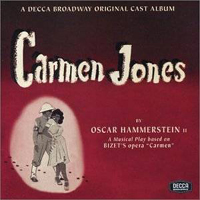 Original Broadway Cast, 1943 (Decca)
Original Broadway Cast, 1943 (Decca)  (4 / 5) It’s easy to understand why Carmen Jones was such a hit on Broadway in 1943. Not only was it a novelty — an Americanized opera with an all-black cast — it was also valid on its own terms. In writing the book and lyrics, Oscar Hammerstein adhered quite closely to Bizet’s opera Carmen. This was no jazzing-down of the score, but there were some bright vernacular equivalents: a factory that makes parachutes (it was during WW-II, remember) instead of cigarettes, a prize fighter (Husky Miller) in place of a toreador (Escamillo), and so on. The opera’s arias, ensembles, and choruses were adapted with great skill; for example, the famous quintet lost none of its spirit and dash in being revamped as “Whizzin’ Away Along de Track.” The show had spoken dialogue rather than recitatives, and what might now seem dated, jarring, and even offensive to some ears — “dat” and “dis” for “that” and “this,” and so on — was seen as candid at the time. As heard here, some cast members show the strain of singing this demanding material several times a week. Others seem intent on proving that this, too, is an opera! But, overall, the album is excellent. Muriel Smith, reportedly a knockout onstage, would be a good Carmen under any circumstances; she sings with fire and conviction. The rest of the company is pretty much up to her standards, with Luther Saxon offering a beautifully sung “Dis Flower.” The commitment level of the performance in general more than makes up for the recording’s minor flaws. (There’s a fun bonus track: Kitty Carlisle’s “Beat Out Dat Rhythm on a Drum.”) — Richard Barrios
(4 / 5) It’s easy to understand why Carmen Jones was such a hit on Broadway in 1943. Not only was it a novelty — an Americanized opera with an all-black cast — it was also valid on its own terms. In writing the book and lyrics, Oscar Hammerstein adhered quite closely to Bizet’s opera Carmen. This was no jazzing-down of the score, but there were some bright vernacular equivalents: a factory that makes parachutes (it was during WW-II, remember) instead of cigarettes, a prize fighter (Husky Miller) in place of a toreador (Escamillo), and so on. The opera’s arias, ensembles, and choruses were adapted with great skill; for example, the famous quintet lost none of its spirit and dash in being revamped as “Whizzin’ Away Along de Track.” The show had spoken dialogue rather than recitatives, and what might now seem dated, jarring, and even offensive to some ears — “dat” and “dis” for “that” and “this,” and so on — was seen as candid at the time. As heard here, some cast members show the strain of singing this demanding material several times a week. Others seem intent on proving that this, too, is an opera! But, overall, the album is excellent. Muriel Smith, reportedly a knockout onstage, would be a good Carmen under any circumstances; she sings with fire and conviction. The rest of the company is pretty much up to her standards, with Luther Saxon offering a beautifully sung “Dis Flower.” The commitment level of the performance in general more than makes up for the recording’s minor flaws. (There’s a fun bonus track: Kitty Carlisle’s “Beat Out Dat Rhythm on a Drum.”) — Richard Barrios
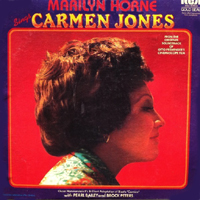 Film Soundtrack, 1954 (RCA/no CD)
Film Soundtrack, 1954 (RCA/no CD)  (4 / 5) Otto Preminger’s movie version of Carmen Jones was daring on numerous fronts: a Hollywood film of an opera (albeit with spoken dialogue), an all-black cast, and a forward look at sexuality. It was a huge success. For movie purposes, a smaller-scale vocal approach than would be heard in an opera house or on Broadway was deemed necessary. Still, like the film itself, this recording works very well on its own terms. Setting the tone as Carmen is the 20-year-old Marilyn Horne, her first name listed in the credits as “Marilynn.” In voice and style, Horne is closer here to Dorothy Dandridge — the on-screen Carmen, and a pop singer of some merit — than to the later Horne, who was to become one of the greatest mezzo soprano divas of the 20th century with her rich low notes and electrifying Rossini roulades. Most of the remainder of the movie cast was dubbed as well, including two other pop singers, Harry Belafonte (by LeVern Hurcherson) and Diahann Carroll (by Bernice Peterson). As Cindy Lou, OlgaJames sings with warmth and sincerity even if she ducks a high note in her big aria, “My Joe.” Pearl Bailey avoids any such problem by singing “Beat Out Dat Rhythm on a Drum” down in her own range; aided by no less than Max Roach on drums, she makes it a piece for the ages. Herschel Burke Gilbert’s musical arrangements are superb, and even though Dandridge’s scorching Carmen needs to be seen, this aural record of the movie is a winner. (Technical note: Although the score was recorded in stereo and may be heard that way on home video releases of the film, the soundtrack LP has never been issued in true stereo.)– R.B.
(4 / 5) Otto Preminger’s movie version of Carmen Jones was daring on numerous fronts: a Hollywood film of an opera (albeit with spoken dialogue), an all-black cast, and a forward look at sexuality. It was a huge success. For movie purposes, a smaller-scale vocal approach than would be heard in an opera house or on Broadway was deemed necessary. Still, like the film itself, this recording works very well on its own terms. Setting the tone as Carmen is the 20-year-old Marilyn Horne, her first name listed in the credits as “Marilynn.” In voice and style, Horne is closer here to Dorothy Dandridge — the on-screen Carmen, and a pop singer of some merit — than to the later Horne, who was to become one of the greatest mezzo soprano divas of the 20th century with her rich low notes and electrifying Rossini roulades. Most of the remainder of the movie cast was dubbed as well, including two other pop singers, Harry Belafonte (by LeVern Hurcherson) and Diahann Carroll (by Bernice Peterson). As Cindy Lou, OlgaJames sings with warmth and sincerity even if she ducks a high note in her big aria, “My Joe.” Pearl Bailey avoids any such problem by singing “Beat Out Dat Rhythm on a Drum” down in her own range; aided by no less than Max Roach on drums, she makes it a piece for the ages. Herschel Burke Gilbert’s musical arrangements are superb, and even though Dandridge’s scorching Carmen needs to be seen, this aural record of the movie is a winner. (Technical note: Although the score was recorded in stereo and may be heard that way on home video releases of the film, the soundtrack LP has never been issued in true stereo.)– R.B.
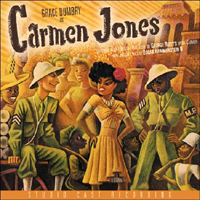 Studio Cast, 1967 (WRC/DRG)
Studio Cast, 1967 (WRC/DRG)  (2 / 5) Another opera diva, Grace Bumbry, built a sizable part of her career on Bizet’s Carmen and turned to the gypsy’s American sister in the recording studio. The result, if not theatrical, sounds beautiful. Bumbry had one of opera’s most luscious voices, and she could be a compelling dramatic performer as well. As Ms. Jones, her tone is plush, but the fire is there only intermittently. Since this recording is very much a “Diva Gets Down” kind of event, the supporting cast takes a back seat; in the case of Joe, that’s just as well, for George Webb is a milquetoast in voice and manner. Bumbry demolishes him in the last scene without so much as chipping her nail polish. The others fare better, and it’s worth noting that the veteran Elisabeth Welch gets to do “Beat Out Dat Rhythm,” which is again transposed down from the original score. She’s good, but Pearl Bailey still wins the prize. This is an acceptable Carmen Jones in true stereo, but a few minutes of either previous recording will show you what’s missing. — R.B.
(2 / 5) Another opera diva, Grace Bumbry, built a sizable part of her career on Bizet’s Carmen and turned to the gypsy’s American sister in the recording studio. The result, if not theatrical, sounds beautiful. Bumbry had one of opera’s most luscious voices, and she could be a compelling dramatic performer as well. As Ms. Jones, her tone is plush, but the fire is there only intermittently. Since this recording is very much a “Diva Gets Down” kind of event, the supporting cast takes a back seat; in the case of Joe, that’s just as well, for George Webb is a milquetoast in voice and manner. Bumbry demolishes him in the last scene without so much as chipping her nail polish. The others fare better, and it’s worth noting that the veteran Elisabeth Welch gets to do “Beat Out Dat Rhythm,” which is again transposed down from the original score. She’s good, but Pearl Bailey still wins the prize. This is an acceptable Carmen Jones in true stereo, but a few minutes of either previous recording will show you what’s missing. — R.B.
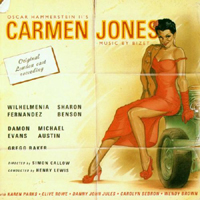 Original London Cast, 1991 (EMI)
Original London Cast, 1991 (EMI)  (1 / 5) It took nearly 50 years for Carmen Jones to cross the Atlantic, and she picked up some baggage for her trip to the Old Vic. The show in its original version was felt to be old-hat, resulting in this glossy production by Simon Callow, with reduced orchestrations and a jazzed-up overture. There were rapturous reviews, numerous awards, and the production had a long run — but, apparently, it was an experience far better suited to live viewing than home listening. At least two factors make this recording unsatisfying: drastically cut-down orchestrations, and back-and-forth switching between the lead singers. Wilhelmenia Fernandez and Damon Evans sing Carmen and Joe in Acts I and IV, while Sharon Benson and Michael Austin do so in Acts II and III. Though all are committed to the task at hand, some fall a bit short. Fernandez has a warm tone but faulty diction. Even more unfortunate, Benson makes “De Cards Don’t Lie” sound nice, light, and even-tempered. (Yes, this is the number in which the cards foretell Carmen’s death!) Evans is a slightly more substantial Joe than the reedy Austin, whose “Dis Flower” is a trial. Karen Parks gets through “My Joe,” and Gregg Baker, another genuine opera singer, is a decent Husky. — R.B.
(1 / 5) It took nearly 50 years for Carmen Jones to cross the Atlantic, and she picked up some baggage for her trip to the Old Vic. The show in its original version was felt to be old-hat, resulting in this glossy production by Simon Callow, with reduced orchestrations and a jazzed-up overture. There were rapturous reviews, numerous awards, and the production had a long run — but, apparently, it was an experience far better suited to live viewing than home listening. At least two factors make this recording unsatisfying: drastically cut-down orchestrations, and back-and-forth switching between the lead singers. Wilhelmenia Fernandez and Damon Evans sing Carmen and Joe in Acts I and IV, while Sharon Benson and Michael Austin do so in Acts II and III. Though all are committed to the task at hand, some fall a bit short. Fernandez has a warm tone but faulty diction. Even more unfortunate, Benson makes “De Cards Don’t Lie” sound nice, light, and even-tempered. (Yes, this is the number in which the cards foretell Carmen’s death!) Evans is a slightly more substantial Joe than the reedy Austin, whose “Dis Flower” is a trial. Karen Parks gets through “My Joe,” and Gregg Baker, another genuine opera singer, is a decent Husky. — R.B.
Carmelina
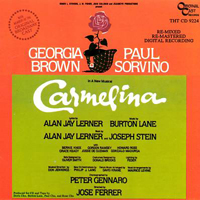 Original Broadway Cast Members, 1980 (Original Cast Records)
Original Broadway Cast Members, 1980 (Original Cast Records)  (3 / 5) Picture Mamma Mia! leavened with wit, charm, and soaring melody, and you’ll have some notion of this two-week 1979 flop. Both are based on the same source material, the 1968 film Buona Sera, Mrs. Campbell — although the creators of both shows denied any connection to it. With music by Burton Lane, lyrics by Alan Jay Lerner, and a book by Lerner and Joseph Stein, Carmelina was critically excoriated as “old-fashioned,” which is sort of like complaining that snowfalls and Courvoisier are old-fashioned. There’s plenty wrong with this not-quite-cast album, assembled well after the show’s closing: Leading man Paul Sorvino, filling in for Broadway lead Cesare Siepi, is vocally and temperamentally miscast; Hershy Kay’s original orchestrations have been replaced with thin, new charts by Philip J. Lang; and Virginia Martin is missing, as is her amusing reprise of “The Image of Me.” Even the vocal balances in the showstopping male trio “One More Walk Around the Garden” are off, robbing the listener of full enjoyment of one of Lane’s most gorgeous melodies. But this remains a rich, romantic score in the classic tradition, with a wonderful title-role turn by Georgia Brown. Convincingly Italian and Anna Magnani-earthy, Brown brilliantly navigates the plot exposition and character-conniving of “Someone in April,” commits wholeheartedly to “Why Him?” and “Love Before Breakfast,” and growls entertainingly through “I’m a Woman.” Note how ingeniously the score tells this offbeat story and compare it with the enormously successful but brainless ABBA-thon that is Mamma Mia! There is no justice. — Marc Miller
(3 / 5) Picture Mamma Mia! leavened with wit, charm, and soaring melody, and you’ll have some notion of this two-week 1979 flop. Both are based on the same source material, the 1968 film Buona Sera, Mrs. Campbell — although the creators of both shows denied any connection to it. With music by Burton Lane, lyrics by Alan Jay Lerner, and a book by Lerner and Joseph Stein, Carmelina was critically excoriated as “old-fashioned,” which is sort of like complaining that snowfalls and Courvoisier are old-fashioned. There’s plenty wrong with this not-quite-cast album, assembled well after the show’s closing: Leading man Paul Sorvino, filling in for Broadway lead Cesare Siepi, is vocally and temperamentally miscast; Hershy Kay’s original orchestrations have been replaced with thin, new charts by Philip J. Lang; and Virginia Martin is missing, as is her amusing reprise of “The Image of Me.” Even the vocal balances in the showstopping male trio “One More Walk Around the Garden” are off, robbing the listener of full enjoyment of one of Lane’s most gorgeous melodies. But this remains a rich, romantic score in the classic tradition, with a wonderful title-role turn by Georgia Brown. Convincingly Italian and Anna Magnani-earthy, Brown brilliantly navigates the plot exposition and character-conniving of “Someone in April,” commits wholeheartedly to “Why Him?” and “Love Before Breakfast,” and growls entertainingly through “I’m a Woman.” Note how ingeniously the score tells this offbeat story and compare it with the enormously successful but brainless ABBA-thon that is Mamma Mia! There is no justice. — Marc Miller
Canterbury Tales
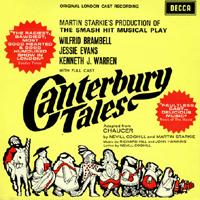 Original London Cast, 1968 (Decca) No stars; not recommended. After a long period during which London produced few musicals of consequence, things picked up in the ’60s. Some even called it the Golden Age of British musicals. One of the London hits of that period, perhaps because it was “racy,” was Canterbury Tales — a loud, tuneless bleat of a musical that ineptly adapted the Chaucer stories. Martin Starkie, working with Professor Neville Coghill’s translation of the tales, dramatized them just as two young composers, Richard Hill and John Hawkins, were writing a suite based on the work. When an LP called The Canterbury Pilgrims, narrated by Starkie, proved successful, a full musicalization evolved with book by Starkie and Coghill, lyrics by Coghill, and music by Hill and Hawkins — none of whom had ever written a musical. The disc reveals no characters and no sense of plot, just a series of short, formless pieces couched in a weird, ugly combination of medieval harmonies and trashy rock music. The songs announce themselves but don’t develop; for example, a number called “Darling, Let Me Teach You How to Kiss” just keeps repeating that phrase. This is the kind of show whose writers think using the word “cock” for “rooster” is pretty hot stuff — ergo the “joke” behind the song “I Have a Noble Cock.” — David Wolf
Original London Cast, 1968 (Decca) No stars; not recommended. After a long period during which London produced few musicals of consequence, things picked up in the ’60s. Some even called it the Golden Age of British musicals. One of the London hits of that period, perhaps because it was “racy,” was Canterbury Tales — a loud, tuneless bleat of a musical that ineptly adapted the Chaucer stories. Martin Starkie, working with Professor Neville Coghill’s translation of the tales, dramatized them just as two young composers, Richard Hill and John Hawkins, were writing a suite based on the work. When an LP called The Canterbury Pilgrims, narrated by Starkie, proved successful, a full musicalization evolved with book by Starkie and Coghill, lyrics by Coghill, and music by Hill and Hawkins — none of whom had ever written a musical. The disc reveals no characters and no sense of plot, just a series of short, formless pieces couched in a weird, ugly combination of medieval harmonies and trashy rock music. The songs announce themselves but don’t develop; for example, a number called “Darling, Let Me Teach You How to Kiss” just keeps repeating that phrase. This is the kind of show whose writers think using the word “cock” for “rooster” is pretty hot stuff — ergo the “joke” behind the song “I Have a Noble Cock.” — David Wolf
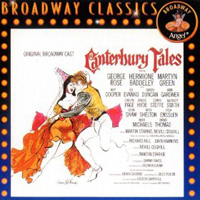 Original Broadway Cast, 1969 (Capitol/Angel)
Original Broadway Cast, 1969 (Capitol/Angel)  (1 / 5) It isn’t just chauvinism that makes me prefer this recording of the failed New York production of Canterbury Tales to the cast album of the successful British original, and it isn’t just stubbornness that makes me tell you it’s still not good. But it is much better. For one thing, the cast is superior, almost without exception. Sandy Duncan, Ed Evanko, Ed Steffe, Martyn Green, Hermione Baddeley, and George Rose perform the mostly dreary material as if it were My Fair Lady. Rose, who brought great style and humor to a number of unfortunate musicals (and revivals of some really good ones), performs a remarkable bit of alchemy with “If She Has Never Loved Before,” in a recording so different from the original that it almost sounds like a new song; here, it’s alive and even funny, a kind of joyous calypso number. Of course, that’s partly thanks to musical director Oscar Kosarin, who really knows how to drive this shaky score while managing to downplay the ugly rock noises heard on the London cast album. This remains a show about a group of English travelers passing the time by telling each other stories. One of the stories, “The Priest’s Tale,” was cut for the American production, along with five songs. Three new songs were added, and one of the originals — “What Do Women Most Desire?” — was totally rewritten as “What Do Women Want?” But the improvements are largely negligible. — D.W.
(1 / 5) It isn’t just chauvinism that makes me prefer this recording of the failed New York production of Canterbury Tales to the cast album of the successful British original, and it isn’t just stubbornness that makes me tell you it’s still not good. But it is much better. For one thing, the cast is superior, almost without exception. Sandy Duncan, Ed Evanko, Ed Steffe, Martyn Green, Hermione Baddeley, and George Rose perform the mostly dreary material as if it were My Fair Lady. Rose, who brought great style and humor to a number of unfortunate musicals (and revivals of some really good ones), performs a remarkable bit of alchemy with “If She Has Never Loved Before,” in a recording so different from the original that it almost sounds like a new song; here, it’s alive and even funny, a kind of joyous calypso number. Of course, that’s partly thanks to musical director Oscar Kosarin, who really knows how to drive this shaky score while managing to downplay the ugly rock noises heard on the London cast album. This remains a show about a group of English travelers passing the time by telling each other stories. One of the stories, “The Priest’s Tale,” was cut for the American production, along with five songs. Three new songs were added, and one of the originals — “What Do Women Most Desire?” — was totally rewritten as “What Do Women Want?” But the improvements are largely negligible. — D.W.
Call Me Mister/This is the Army/Winged Victory
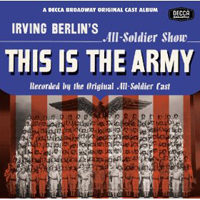 Original Broadway Cast, 1946 (Decca)
Original Broadway Cast, 1946 (Decca)  (4 / 5) The well-produced CD transfer of recordings made by members of the original cast of Call Me Mister, featuring a rediscovered, extended version of composer-lyricist Harold Rome’s aristocratic ballad “When We Meet Again,” proves that the show had more of an emotional arc than most revues. It starts thrillingly with a racially integrated chorus (rare in 1946), led by the excellent baritone Lawrence Winters, singing “Going Home Train.” The number is a multi-part rondo, a Rome specialty (“Did our share for liberty / Fought the guys who would destroy it / Now we’re goin’ back to enjoy it”), and an unusual instance of postwar patriotism that’s neither mawkish nor overbearing. The same happy-returning-G.I. motif resurfaces in the roof-raising title song (“Just call me Mister from now on”). But the score isn’t all flag-waving: “Military Life” presents the funny flip side of army conditioning. A moving tribute to F.D.R., “The Face on the Dime,” is sung by Winters, and the show had some rising-star power in the person of Betty Garrett, whose spirited rendition of “South America, Take It Away” swept the country. Also appealing are Garrett’s wistfully comic “Little Surplus Me” and confidently satirical “Yuletide, Park Avenue.” At 30 minutes in length, the Call Me Mister portion of this CD (which also includes selections from This Is the Army and Winged Victory) must be missing loads of material that was performed in the show itself. But what’s here, as they used to say, is cherce. — Marc Miller
(4 / 5) The well-produced CD transfer of recordings made by members of the original cast of Call Me Mister, featuring a rediscovered, extended version of composer-lyricist Harold Rome’s aristocratic ballad “When We Meet Again,” proves that the show had more of an emotional arc than most revues. It starts thrillingly with a racially integrated chorus (rare in 1946), led by the excellent baritone Lawrence Winters, singing “Going Home Train.” The number is a multi-part rondo, a Rome specialty (“Did our share for liberty / Fought the guys who would destroy it / Now we’re goin’ back to enjoy it”), and an unusual instance of postwar patriotism that’s neither mawkish nor overbearing. The same happy-returning-G.I. motif resurfaces in the roof-raising title song (“Just call me Mister from now on”). But the score isn’t all flag-waving: “Military Life” presents the funny flip side of army conditioning. A moving tribute to F.D.R., “The Face on the Dime,” is sung by Winters, and the show had some rising-star power in the person of Betty Garrett, whose spirited rendition of “South America, Take It Away” swept the country. Also appealing are Garrett’s wistfully comic “Little Surplus Me” and confidently satirical “Yuletide, Park Avenue.” At 30 minutes in length, the Call Me Mister portion of this CD (which also includes selections from This Is the Army and Winged Victory) must be missing loads of material that was performed in the show itself. But what’s here, as they used to say, is cherce. — Marc Miller
Candide
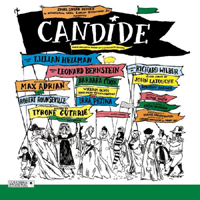 Original Broadway Cast, 1956 (Columbia/Sony)
Original Broadway Cast, 1956 (Columbia/Sony)  (5 / 5) This recording starts with the most exciting overture in Broadway history, and just keeps getting better after that. Leonard Bernstein’s gilded score for this adaptation of Voltaire’s classic is one of the great glories of the American musical theater. Unfortunately, Lillian Hellman’s libretto failed to please, and the show had a pitifully short run; but, happily, numerous “revisals” have kept the work alive. Here, Bernstein’s peerless melodies, and piercingly witty lyrics by a trio of poets — Richard Wilbur, John Latouche, and Dorothy Parker — are performed by a first-rate cast. Robert Rounseville plays the title role of the naïve youth whose optimism sees him through a series of disasters; he’s especially touching in the ballad “It Must Be So.” Max Adrian is delightful as Dr. Pangloss, whose boundless optimism infects his young charges; in “The Best of All Possible Worlds,” he gets things off to a jaunty start. Other standouts are William Olvis as a gleefully corrupt governor (his wooing ways are made explicit in “My Love”) and Irra Petina as the Old Lady (she leads the showstopping “I Am Easily Assimilated”). Best of all is young Barbara Cook as Cunegonde, Candide’s compromised love. She’s ravishingly innocent in the duet “Oh, Happy We” and then, a few tracks later, riotously cynical and corrupt in the stupendous aria “Glitter and Be Gay.” Her rendition of this number is one of the essential recorded performances in Broadway history. Among the album’s other highlights are “What’s the Use?”, performed by a quartet of connivers, and the stunning choral finale “Make Our Garden Grow.” The entire score is wrapped in the brilliant orchestrations of Bernstein and Hershy Kay. This recording is a permanent pleasure and a must for every musical theater collection. — David Barbour
(5 / 5) This recording starts with the most exciting overture in Broadway history, and just keeps getting better after that. Leonard Bernstein’s gilded score for this adaptation of Voltaire’s classic is one of the great glories of the American musical theater. Unfortunately, Lillian Hellman’s libretto failed to please, and the show had a pitifully short run; but, happily, numerous “revisals” have kept the work alive. Here, Bernstein’s peerless melodies, and piercingly witty lyrics by a trio of poets — Richard Wilbur, John Latouche, and Dorothy Parker — are performed by a first-rate cast. Robert Rounseville plays the title role of the naïve youth whose optimism sees him through a series of disasters; he’s especially touching in the ballad “It Must Be So.” Max Adrian is delightful as Dr. Pangloss, whose boundless optimism infects his young charges; in “The Best of All Possible Worlds,” he gets things off to a jaunty start. Other standouts are William Olvis as a gleefully corrupt governor (his wooing ways are made explicit in “My Love”) and Irra Petina as the Old Lady (she leads the showstopping “I Am Easily Assimilated”). Best of all is young Barbara Cook as Cunegonde, Candide’s compromised love. She’s ravishingly innocent in the duet “Oh, Happy We” and then, a few tracks later, riotously cynical and corrupt in the stupendous aria “Glitter and Be Gay.” Her rendition of this number is one of the essential recorded performances in Broadway history. Among the album’s other highlights are “What’s the Use?”, performed by a quartet of connivers, and the stunning choral finale “Make Our Garden Grow.” The entire score is wrapped in the brilliant orchestrations of Bernstein and Hershy Kay. This recording is a permanent pleasure and a must for every musical theater collection. — David Barbour
 Broadway Cast, 1974 (Columbia, 2LPs/2CDs)
Broadway Cast, 1974 (Columbia, 2LPs/2CDs)  (1 / 5) For this production, Harold Prince gave Candide a new book by Hugh Wheeler and additional lyrics by Stephen Sondheim. Prince’s staging, with plenty of sight gags and sex jokes, enjoyed a good run. This album, however, is the least of the show’s many versions on disc. It includes most of the book, so you must endure long stretches of obvious humor to get to the songs. You also have to deal with Hershy Kay’s reduced orchestrations and the capable but unexciting voices of Mark Baker as Candide and Maureen Brennan as Cunegonde. June Gable makes an amusing Old Lady, but Lewis J. Stadlen, playing Voltaire (who narrates), Dr. Pangloss, the Governor, and others, offers a performance that consists mainly of trick voices. The song list includes the “Auto-Da-Fé” sequence and “Candide’s Lament,” a moving ballad, neither of which are on the original recording. But the fine “EI Dorado,” “What’s the Use?” and “Venice Gavotte” are gone; and “Sheep Song,” a too-cute entry, more or less replaces “EI Dorado.” A nice innovation is having “Life Is Happiness Indeed” introduce the lead characters. Another is having the Governor sing “My Love” not to Cunegonde but to Maximilian, her foppish brother, when the latter is dressed in drag. Paradoxically, the longest-running production of Candide yielded this least interesting recording, which perhaps explains why its CD release was belated. — D.B.
(1 / 5) For this production, Harold Prince gave Candide a new book by Hugh Wheeler and additional lyrics by Stephen Sondheim. Prince’s staging, with plenty of sight gags and sex jokes, enjoyed a good run. This album, however, is the least of the show’s many versions on disc. It includes most of the book, so you must endure long stretches of obvious humor to get to the songs. You also have to deal with Hershy Kay’s reduced orchestrations and the capable but unexciting voices of Mark Baker as Candide and Maureen Brennan as Cunegonde. June Gable makes an amusing Old Lady, but Lewis J. Stadlen, playing Voltaire (who narrates), Dr. Pangloss, the Governor, and others, offers a performance that consists mainly of trick voices. The song list includes the “Auto-Da-Fé” sequence and “Candide’s Lament,” a moving ballad, neither of which are on the original recording. But the fine “EI Dorado,” “What’s the Use?” and “Venice Gavotte” are gone; and “Sheep Song,” a too-cute entry, more or less replaces “EI Dorado.” A nice innovation is having “Life Is Happiness Indeed” introduce the lead characters. Another is having the Governor sing “My Love” not to Cunegonde but to Maximilian, her foppish brother, when the latter is dressed in drag. Paradoxically, the longest-running production of Candide yielded this least interesting recording, which perhaps explains why its CD release was belated. — D.B.
 New York City Opera Cast, 1982 (New World Records, 2CDs)
New York City Opera Cast, 1982 (New World Records, 2CDs)  (2 / 5) Harold Prince supervised the creation of yet another version of Candide for the New York City Opera, combining elements of the previous two productions. The two-disc recording has its moments, but these opera singers don’t make the most of the brilliant lyrics, and at times they seem overwhelmed by the orchestra. The more serious songs come off best, including a superb “Make Our Garden Grow.” Erie Mills’ Cunegonde was much admired, and her “Glitter and Be Gay” is certainly adept. David Eisler and Joyce Castle are capable as Candide and the Old Lady, as is John lankston as Voltaire, Pangloss, and others. Pangloss has a new number, “Dear Boy,” and Candide has a “Ballad of the New World.” The first act “Quartet Finale” is back; so are the trio “Quiet” and “What’s the Use?” — D.B.
(2 / 5) Harold Prince supervised the creation of yet another version of Candide for the New York City Opera, combining elements of the previous two productions. The two-disc recording has its moments, but these opera singers don’t make the most of the brilliant lyrics, and at times they seem overwhelmed by the orchestra. The more serious songs come off best, including a superb “Make Our Garden Grow.” Erie Mills’ Cunegonde was much admired, and her “Glitter and Be Gay” is certainly adept. David Eisler and Joyce Castle are capable as Candide and the Old Lady, as is John lankston as Voltaire, Pangloss, and others. Pangloss has a new number, “Dear Boy,” and Candide has a “Ballad of the New World.” The first act “Quartet Finale” is back; so are the trio “Quiet” and “What’s the Use?” — D.B.
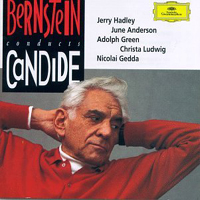 “Bernstein Conducts Candide,” 1989 (Deutsche Grammophon, 2CDs)
“Bernstein Conducts Candide,” 1989 (Deutsche Grammophon, 2CDs)  (5 / 5) This is a welcome entry. The great composer-conductor Bernstein, who had little to do with the two Harold Prince productions, decided to compile everything for an all-conclusive, “final revised edition” of the Candide score. Eschewing the labored gags of the previous two versions, this one restores the somber undertone that is central to the composer’s original conception. Additions include the opening “Westphalia Chorale”; the frequently heard refrain “Universal Good”; “Words, Words, Words,” written for Martin, the alter ego of Pangloss; “We Are Women,” a duet for Cunegonde and the Old Lady; and “The King’s Barcarolle,” in which five deposed monarchs yearn for the simple life. Restored are “El Dorado” and “Venice Gavotte.” Best of all is “Nothing More Than This,” an anguished solo for Candide that functions as a kind of 11-o’clock number. Bernstein’s conducting is nothing less than thrilling; on no other disc does the orchestra make such an impression. The high-profile cast is led by opera stars Jerry Hadley (Candide), June Anderson (Cunegonde), Christa Ludwig (the Old Lady), and Nicolai Gedda (the Governor, among other roles). Although opera singers aren’t always at home with such challenging lyrics, this cast is fine in that regard, Ludwig and Gedda being the standouts. Leave it to Adolph Green, of all people, to shine in such company, showing off his clear diction and comic gusto in the dual role of Pangloss/Martin. This recording is a must for fans of the score, thanks to Bernstein’s conducting and the sheer mass of material. — D.B.
(5 / 5) This is a welcome entry. The great composer-conductor Bernstein, who had little to do with the two Harold Prince productions, decided to compile everything for an all-conclusive, “final revised edition” of the Candide score. Eschewing the labored gags of the previous two versions, this one restores the somber undertone that is central to the composer’s original conception. Additions include the opening “Westphalia Chorale”; the frequently heard refrain “Universal Good”; “Words, Words, Words,” written for Martin, the alter ego of Pangloss; “We Are Women,” a duet for Cunegonde and the Old Lady; and “The King’s Barcarolle,” in which five deposed monarchs yearn for the simple life. Restored are “El Dorado” and “Venice Gavotte.” Best of all is “Nothing More Than This,” an anguished solo for Candide that functions as a kind of 11-o’clock number. Bernstein’s conducting is nothing less than thrilling; on no other disc does the orchestra make such an impression. The high-profile cast is led by opera stars Jerry Hadley (Candide), June Anderson (Cunegonde), Christa Ludwig (the Old Lady), and Nicolai Gedda (the Governor, among other roles). Although opera singers aren’t always at home with such challenging lyrics, this cast is fine in that regard, Ludwig and Gedda being the standouts. Leave it to Adolph Green, of all people, to shine in such company, showing off his clear diction and comic gusto in the dual role of Pangloss/Martin. This recording is a must for fans of the score, thanks to Bernstein’s conducting and the sheer mass of material. — D.B.
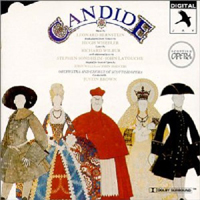 Scottish Opera Cast, 1991 (JAY)
Scottish Opera Cast, 1991 (JAY)  (3 / 5) This one-disc recording has a song stack that’s a close match to the original Broadway cast album. It’s also one of the more sparkling renditions of the score, with a cast of full-bodied opera singers. Nickolas Grace’s impeccable diction and comic sense make him a fine Pangloss, Mark Beudert offers an exceptionally well-sung Candide, and Ann Howard is a vivacious Old Lady. As Cunegonde, Marilyn Hill Smith delivers a memorable “Glitter and Be Gay” with a fine sense of high comedy. The orchestra, conducted by Justin Brown, tends to favor brass over strings, but Brown’s tempi are energetic throughout. — D.B.
(3 / 5) This one-disc recording has a song stack that’s a close match to the original Broadway cast album. It’s also one of the more sparkling renditions of the score, with a cast of full-bodied opera singers. Nickolas Grace’s impeccable diction and comic sense make him a fine Pangloss, Mark Beudert offers an exceptionally well-sung Candide, and Ann Howard is a vivacious Old Lady. As Cunegonde, Marilyn Hill Smith delivers a memorable “Glitter and Be Gay” with a fine sense of high comedy. The orchestra, conducted by Justin Brown, tends to favor brass over strings, but Brown’s tempi are energetic throughout. — D.B.
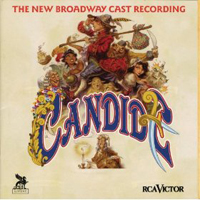 Broadway Cast, 1997 (RCA)
Broadway Cast, 1997 (RCA)  (3 / 5) Although this fussy, over-elaborate production quickly closed, the cast recording has its points of interest, beginning with Jim Dale’s urbanely witty performance as Voltaire, Pangloss, and others. The show’s book was retooled yet again, this time to give Andrea Martin more to do as the Old Lady, and she is a riotous presence; her rendition of “I Am Easily Assimilated” is a gem. Jason Danieley displays a golden voice and innocent manner that are are right on for the role of Candide, in contrast to Harolyn Blackwell’s well-sung but occasionally too knowing Cunegonde. Brent Barrett is very strong as Maximilian, and turning up here and there are Borscht Belt clowns Arte Johnson and Mal Z. Lawrence. While not on a par with the best Candide recordings, this one does offer acceptable performances of the score’s highlights. — D.B.
(3 / 5) Although this fussy, over-elaborate production quickly closed, the cast recording has its points of interest, beginning with Jim Dale’s urbanely witty performance as Voltaire, Pangloss, and others. The show’s book was retooled yet again, this time to give Andrea Martin more to do as the Old Lady, and she is a riotous presence; her rendition of “I Am Easily Assimilated” is a gem. Jason Danieley displays a golden voice and innocent manner that are are right on for the role of Candide, in contrast to Harolyn Blackwell’s well-sung but occasionally too knowing Cunegonde. Brent Barrett is very strong as Maximilian, and turning up here and there are Borscht Belt clowns Arte Johnson and Mal Z. Lawrence. While not on a par with the best Candide recordings, this one does offer acceptable performances of the score’s highlights. — D.B.
 Royal National Theatre Cast, 1999 (First Night)
Royal National Theatre Cast, 1999 (First Night)  (4 / 5) According to the notes on this recording, the Royal National Theatre production featured Hugh Wheeler’s book “in a new version by John Caird,” who also directed. Actually, it’s a blend of many previous editions. Bruce Coughlin’s orchestrations are not as sparkling as the Bernstein-Kay originals, but they have a pleasing intimacy, and music director Mark W. Dorrell takes the score to a rapid clip. Innovations include a slightly different opening sequence, “Life Is Happiness Unending”; a new version of “Universal Good”; new lyrics for “Nothing More Than This” and the “Quartet Finale”; and a totally new version of “What’s the Use?” Simon Russell Beale displays savoir faire and a fine voice as Voltaire/Pangloss. He’s particularly amusing in “Dear Boy,” rationalizing syphilis as a gift of the New World: “Without the little spirochete / We’d have no chocolate to eat!” The cast also includes distinguished artists Denis Quilley (the Baron/Martin) and Clive Rowe (the Drill Sargeant/Cacambo). In the latter role, Rowe sings “El Dorado” as a duet with the fine Candide of Daniel Evans. Alex Kelly is the best Cunegonde since Cook, delivering a grand “Glitter and Be Gay,” and Beverly Klein is a lively Old Woman. The entire company blends superb diction with fine musical values, skills that are particularly noticeable in the most exciting rendition ever of “Auto-da-Fé.” Not everything here works — the new version of “What’s the Use” disappoints, for example — but this recording is very worthy overall. — D.B.
(4 / 5) According to the notes on this recording, the Royal National Theatre production featured Hugh Wheeler’s book “in a new version by John Caird,” who also directed. Actually, it’s a blend of many previous editions. Bruce Coughlin’s orchestrations are not as sparkling as the Bernstein-Kay originals, but they have a pleasing intimacy, and music director Mark W. Dorrell takes the score to a rapid clip. Innovations include a slightly different opening sequence, “Life Is Happiness Unending”; a new version of “Universal Good”; new lyrics for “Nothing More Than This” and the “Quartet Finale”; and a totally new version of “What’s the Use?” Simon Russell Beale displays savoir faire and a fine voice as Voltaire/Pangloss. He’s particularly amusing in “Dear Boy,” rationalizing syphilis as a gift of the New World: “Without the little spirochete / We’d have no chocolate to eat!” The cast also includes distinguished artists Denis Quilley (the Baron/Martin) and Clive Rowe (the Drill Sargeant/Cacambo). In the latter role, Rowe sings “El Dorado” as a duet with the fine Candide of Daniel Evans. Alex Kelly is the best Cunegonde since Cook, delivering a grand “Glitter and Be Gay,” and Beverly Klein is a lively Old Woman. The entire company blends superb diction with fine musical values, skills that are particularly noticeable in the most exciting rendition ever of “Auto-da-Fé.” Not everything here works — the new version of “What’s the Use” disappoints, for example — but this recording is very worthy overall. — D.B.
Can-Can
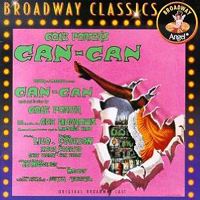 Original Broadway Cast, 1953 (Capitol/Angel)
Original Broadway Cast, 1953 (Capitol/Angel)  (5 / 5) Although Gwen Verdon was catapulted to stardom in this pizzazz-y, Broadway-Gallic concoction, the true star of the show is Cole Porter. The great composer-lyricist wrote many songs dedicated to the “o-la-la” aspects of the Paris he adored, and Can-Can is his most melodic excursion into Parisian love, sex, and nightlife. The lyrics are as witty and lusty as the infectious music in a score that includes the much-loved standards “It’s All Right With Me,” “I Love Paris,” and “C’est Magnifique.” Happily, the cast album captures the exuberance of a live Broadway show, its clear, high-fidelity monophonic sound and crisp performances combining to make it an excellent example of 1950s showbiz chutzpah. Lilo, the lead chanteuse, belts out her numbers with tremendous joie de vivre. Her most effective song is the naughty, defiant “Live and Let Live.” Her authentic French accent adds to the fun, although it may take some doing to decipher all of Porter’s clever uses of the word “can” when Lilo tongue-twists her way through the title song. Verdon is heard only briefly on the recording, since she was the dancing star of the show, but her comedy number with the inimitable Hans Conried, “If You Loved Me Truly,” is a fun throwaway song. Peter Cookson is the stalwart baritone who beautifully, if somewhat stiffly, renders great lines like “It’s the wrong time and the wrong place.” His best number, “I Am in Love,” is a little-known Porter masterpiece, with such choice lyrics as “Should I order cyanide or order champagne?” You should definitely order champagne while listening to this gem. — Gerard Alessandrini
(5 / 5) Although Gwen Verdon was catapulted to stardom in this pizzazz-y, Broadway-Gallic concoction, the true star of the show is Cole Porter. The great composer-lyricist wrote many songs dedicated to the “o-la-la” aspects of the Paris he adored, and Can-Can is his most melodic excursion into Parisian love, sex, and nightlife. The lyrics are as witty and lusty as the infectious music in a score that includes the much-loved standards “It’s All Right With Me,” “I Love Paris,” and “C’est Magnifique.” Happily, the cast album captures the exuberance of a live Broadway show, its clear, high-fidelity monophonic sound and crisp performances combining to make it an excellent example of 1950s showbiz chutzpah. Lilo, the lead chanteuse, belts out her numbers with tremendous joie de vivre. Her most effective song is the naughty, defiant “Live and Let Live.” Her authentic French accent adds to the fun, although it may take some doing to decipher all of Porter’s clever uses of the word “can” when Lilo tongue-twists her way through the title song. Verdon is heard only briefly on the recording, since she was the dancing star of the show, but her comedy number with the inimitable Hans Conried, “If You Loved Me Truly,” is a fun throwaway song. Peter Cookson is the stalwart baritone who beautifully, if somewhat stiffly, renders great lines like “It’s the wrong time and the wrong place.” His best number, “I Am in Love,” is a little-known Porter masterpiece, with such choice lyrics as “Should I order cyanide or order champagne?” You should definitely order champagne while listening to this gem. — Gerard Alessandrini
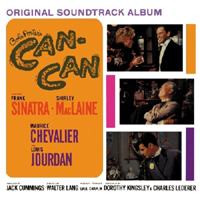 Film Soundtrack, 190 (Capitol)
Film Soundtrack, 190 (Capitol)  (2 / 5) Frank Sinatra, Shirley MacLaine, Maurice Chevalier, and Louis Jourdan were huge stars when this soundtrack for the film version of Can-Can was recorded. With all those famous names over the title, the flick was a hit, but an avalanche of Hollywood kitsch suffocated almost all of the charm and wit of Cole Porter’s Broadway show. Musical director Nelson Riddle provided overblown, frantic orchestrations. This isn’t music to drink French champagne by, it calls for several glasses of scotch in the leopard-skin lounge of a Pasadena golf course. However, Porter’s songs are so durable that even their saloon interpretations by Sinatra and MacLaine are somewhat appealing on their own terms. The French co-stars fare better: Chevalier’s devil-may-care performance of “Just One of Those Things” (added to the score) has its own charm, while Jourdan’s rendition of “You Do Something to Me” is surprisingly well sung. Indeed, it may be one of the most enchanting versions of the song ever recorded. But too much of the show score has been eliminated or altered. For example, although the title song is heard as an instrumental, MacLaine never gets to sing those witty Porter lyrics. Some of the better ballads, such as “Allez-Vous En,” are missing altogether, and “I Love Paris” is bizarrely performed as a romantic duet between Chevalier and Sinatra! — G.A.
(2 / 5) Frank Sinatra, Shirley MacLaine, Maurice Chevalier, and Louis Jourdan were huge stars when this soundtrack for the film version of Can-Can was recorded. With all those famous names over the title, the flick was a hit, but an avalanche of Hollywood kitsch suffocated almost all of the charm and wit of Cole Porter’s Broadway show. Musical director Nelson Riddle provided overblown, frantic orchestrations. This isn’t music to drink French champagne by, it calls for several glasses of scotch in the leopard-skin lounge of a Pasadena golf course. However, Porter’s songs are so durable that even their saloon interpretations by Sinatra and MacLaine are somewhat appealing on their own terms. The French co-stars fare better: Chevalier’s devil-may-care performance of “Just One of Those Things” (added to the score) has its own charm, while Jourdan’s rendition of “You Do Something to Me” is surprisingly well sung. Indeed, it may be one of the most enchanting versions of the song ever recorded. But too much of the show score has been eliminated or altered. For example, although the title song is heard as an instrumental, MacLaine never gets to sing those witty Porter lyrics. Some of the better ballads, such as “Allez-Vous En,” are missing altogether, and “I Love Paris” is bizarrely performed as a romantic duet between Chevalier and Sinatra! — G.A.
Camelot
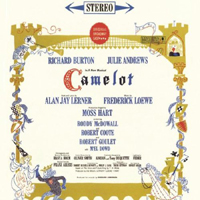 Original Broadway Cast, 1960 (Columbia/Sony)
Original Broadway Cast, 1960 (Columbia/Sony)  (5 / 5) Composition, performance, and audio technology all came together to make this a first-rate cast recording. Although Camelot is not as highly regarded as Lerner and Loewe’s masterpiece My Fair Lady, this album makes it sound like one of the best Broadway musicals of all time. Richard Burton in the role of King Arthur is at his absolute peak as a great stage actor, bringing extra substance to the character by virtue of his classical training. Surprisingly, Burton’s singing voice is rich and clear; he easily sails through the score, serving the Frederick Loewe melodies beautifully and delivering the witty and romantic Alan Jay Lerner lyrics as if they were the immortal words of the Bard himself. Julie Andrews is Guenevere, and her performances of such songs as “The Simple Joys of Maidenhood” and “I Loved You Once in Silence” are as good as anything she has ever recorded. To round out the perfect casting, Robert Goulet is Lancelot; when he introduced the great love song “If Ever I Would Leave You,” Goulet had one of the finest baritone voices ever heard on Broadway. Roddy McDowell and Robert Coote are also on hand for some star-power fun. The book of Camelot, based on the massive novel The Once and Future King, by T. H. White, has often been called unwieldy; but with the score isolated, the album is a gem. The songs are variously intricate, operatic, lyrical, charming, and delightfully funny. Meticulously conducted by Franz Allers, the orchestrations by Philip J. Lang and Robert Russell Bennett are a fine example of the best of those written during the golden age of Broadway musicals. By 1960, stereophonic recording on magnetic tape had been perfected and, even by today’s digital standards, this glorious score sounds magnificent here. Avid collectors may want to seek out the original vinyl LP edition; look for a laminated, blue-and-gold, gatefold album loaded with stunning color photos that give it a lavish storybook quality. You may even find that a copy of the LP in good condition sounds more expansive and warmer than subsequent compact discs editions of the recording. It’s a grand memento of the glamorous Kennedy era and a time when Broadway shows were the ultimate in entertainment. — Gerard Alessandrini
(5 / 5) Composition, performance, and audio technology all came together to make this a first-rate cast recording. Although Camelot is not as highly regarded as Lerner and Loewe’s masterpiece My Fair Lady, this album makes it sound like one of the best Broadway musicals of all time. Richard Burton in the role of King Arthur is at his absolute peak as a great stage actor, bringing extra substance to the character by virtue of his classical training. Surprisingly, Burton’s singing voice is rich and clear; he easily sails through the score, serving the Frederick Loewe melodies beautifully and delivering the witty and romantic Alan Jay Lerner lyrics as if they were the immortal words of the Bard himself. Julie Andrews is Guenevere, and her performances of such songs as “The Simple Joys of Maidenhood” and “I Loved You Once in Silence” are as good as anything she has ever recorded. To round out the perfect casting, Robert Goulet is Lancelot; when he introduced the great love song “If Ever I Would Leave You,” Goulet had one of the finest baritone voices ever heard on Broadway. Roddy McDowell and Robert Coote are also on hand for some star-power fun. The book of Camelot, based on the massive novel The Once and Future King, by T. H. White, has often been called unwieldy; but with the score isolated, the album is a gem. The songs are variously intricate, operatic, lyrical, charming, and delightfully funny. Meticulously conducted by Franz Allers, the orchestrations by Philip J. Lang and Robert Russell Bennett are a fine example of the best of those written during the golden age of Broadway musicals. By 1960, stereophonic recording on magnetic tape had been perfected and, even by today’s digital standards, this glorious score sounds magnificent here. Avid collectors may want to seek out the original vinyl LP edition; look for a laminated, blue-and-gold, gatefold album loaded with stunning color photos that give it a lavish storybook quality. You may even find that a copy of the LP in good condition sounds more expansive and warmer than subsequent compact discs editions of the recording. It’s a grand memento of the glamorous Kennedy era and a time when Broadway shows were the ultimate in entertainment. — Gerard Alessandrini
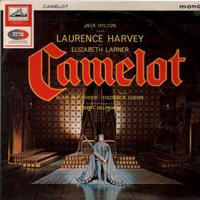 Original London Cast, 1964 (First Night/no CD)
Original London Cast, 1964 (First Night/no CD)  (2 / 5) This recording lacks the fine musicality of the original Broadway cast album. In the role of King Arthur, Laurence Harvey displays a resonant voice, and his classical training and romantic appeal are evident. What’s missing is a melodic lilt to his voice, and, unlike Richard Burton, Harvey cannot sustain notes; the tempi of many of his songs are too fast, presumably in deference to his vocal limitations. His Guenevere, Elizabeth Larner, has a beautiful voice and delivers her songs very appealingly, but in her case and that of Barry Kent as Lancelot, listeners may feel as if they’re hearing standbys for the absent stars Julie Andrews and Robert Goulet. Among the other soloists heard on the recording are Nicky Henson as Mordred and Josephine Gordon as Nimue. The album does include a recording of “The Joust,” which is not on the Broadway album. If only for that reason, it may be of interest to collectors. — G.A.
(2 / 5) This recording lacks the fine musicality of the original Broadway cast album. In the role of King Arthur, Laurence Harvey displays a resonant voice, and his classical training and romantic appeal are evident. What’s missing is a melodic lilt to his voice, and, unlike Richard Burton, Harvey cannot sustain notes; the tempi of many of his songs are too fast, presumably in deference to his vocal limitations. His Guenevere, Elizabeth Larner, has a beautiful voice and delivers her songs very appealingly, but in her case and that of Barry Kent as Lancelot, listeners may feel as if they’re hearing standbys for the absent stars Julie Andrews and Robert Goulet. Among the other soloists heard on the recording are Nicky Henson as Mordred and Josephine Gordon as Nimue. The album does include a recording of “The Joust,” which is not on the Broadway album. If only for that reason, it may be of interest to collectors. — G.A.
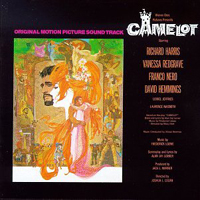 Film Soundtrack, 1967 (Warner Bros)
Film Soundtrack, 1967 (Warner Bros)  (3 / 5) Wonderful orchestrations almost elevate this Hollywood version of the enduring Broadway hit into the category of great recorded music — but not quite. The team of Alfred Newman (conductor), Ken Darby (choral arrangements), and Edward Powell (orchestrations) gave the Lerner-Loewe songs the royal treatment, but uneven vocal performances keep this album from equaling the Broadway recording as a fully satisfying performance of the score. Although Vanessa Redgrave does a fine acting job in the film as Guenevere, her singing is barely adequate; she does her best to “act” her way through songs written for the voice of Julie Andrews, but she seems to be trying too hard for effect. As a result, Redgrave sounds campy in many of her musical moments. Richard Harris is a better singer with a greater range, but his acting is overwrought and forced in the role of King Arthur. Gene Merlino, dubbing Lancelot’s songs for Franco Nero, fares better. Fans of this durable score may delight in the magnificent arrangements of the overture and choral selections such as “Follow Me.” If Warner ever decides to issue a more complete version of the soundtrack album, including the Korngold-like treatment of Loewe’s background score, that would be a must-have item. As it is, this edition is disappointing. — G.A.
(3 / 5) Wonderful orchestrations almost elevate this Hollywood version of the enduring Broadway hit into the category of great recorded music — but not quite. The team of Alfred Newman (conductor), Ken Darby (choral arrangements), and Edward Powell (orchestrations) gave the Lerner-Loewe songs the royal treatment, but uneven vocal performances keep this album from equaling the Broadway recording as a fully satisfying performance of the score. Although Vanessa Redgrave does a fine acting job in the film as Guenevere, her singing is barely adequate; she does her best to “act” her way through songs written for the voice of Julie Andrews, but she seems to be trying too hard for effect. As a result, Redgrave sounds campy in many of her musical moments. Richard Harris is a better singer with a greater range, but his acting is overwrought and forced in the role of King Arthur. Gene Merlino, dubbing Lancelot’s songs for Franco Nero, fares better. Fans of this durable score may delight in the magnificent arrangements of the overture and choral selections such as “Follow Me.” If Warner ever decides to issue a more complete version of the soundtrack album, including the Korngold-like treatment of Loewe’s background score, that would be a must-have item. As it is, this edition is disappointing. — G.A.
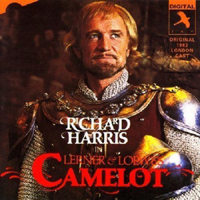 London Cast, 1982 (Varese Sarabande)
London Cast, 1982 (Varese Sarabande)  (1 / 5) Richard Harris, who starred as King Arthur in the movie of Camelot, toured extensively in the role. By the time he recorded this London cast album, his performance was as petrified as aged wood, and anything that was good about his characterization in the film had been obliterated. The concept of the Lerner-Loewe musical was to portray King Arthur as a young, vibrant leader, not a stodgy old monarch. When Harris made the film, he was an attractive, sexually vital, youngish actor; when he returned to the part on tour years later, his age completely subverted the story. In this recording, Harris rasps his way through the jaunty title song and delivers an over-the-top performance more appropriate to the dusty old Shakespearean actor in The Fantasticks. By the end of the album, he is indulging in vocal histrionics that are ludicrous. Fiona Fullerton as Guenevere sounds quite lovely, but Robert Meadmore as Lancelot is no baritone; his voice has a bleating, high-tenor timbre that’s jarring. All in all, this recording is of little value except as one of the most unintentionally comedic cast albums of all time. Ultimately, Harris himself chisels its epitaph when, at the end, he screams insanely: “R-U-U-N-N, BOY! R-U-U-U-N-N-N!!!!” — G.A.
(1 / 5) Richard Harris, who starred as King Arthur in the movie of Camelot, toured extensively in the role. By the time he recorded this London cast album, his performance was as petrified as aged wood, and anything that was good about his characterization in the film had been obliterated. The concept of the Lerner-Loewe musical was to portray King Arthur as a young, vibrant leader, not a stodgy old monarch. When Harris made the film, he was an attractive, sexually vital, youngish actor; when he returned to the part on tour years later, his age completely subverted the story. In this recording, Harris rasps his way through the jaunty title song and delivers an over-the-top performance more appropriate to the dusty old Shakespearean actor in The Fantasticks. By the end of the album, he is indulging in vocal histrionics that are ludicrous. Fiona Fullerton as Guenevere sounds quite lovely, but Robert Meadmore as Lancelot is no baritone; his voice has a bleating, high-tenor timbre that’s jarring. All in all, this recording is of little value except as one of the most unintentionally comedic cast albums of all time. Ultimately, Harris himself chisels its epitaph when, at the end, he screams insanely: “R-U-U-N-N, BOY! R-U-U-U-N-N-N!!!!” — G.A.
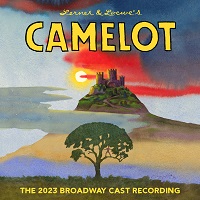 Broadway Cast, 2023 (Broadway Records)
Broadway Cast, 2023 (Broadway Records)  (1 / 5) This cast album is somewhat more enjoyable in its own right than the production that yielded it, which was a near-complete misfire — primarily due to the bizarre direction of Bartlett Sher and the too-clever-by-half, aggressively post-modern rewrite of Alan Jay Lerner’s book that Aaron Sorkin crafted for this show, which many consider a classic despite its flaws as originally written and conceived. Nor are the performances of the leads good enough to compensate. Following a bland reading of the overture led by musical director/conductor Kimberly Grigsby, Andrew Burnap’s King Arthur comes across in “I Wonder What the King is Doing Tonight” and the title song as a sweet, young guy of the type you might find in a Hallmark holiday TV movie. Phillipa Soo as Guenevere does an overall fine job with “The Simple Joys of Maidenhood,” and having her sing this song to Arthur, rather than to the audience as a musical monologue, was one of the few good ideas in this production. Jordan Donica’s virile baritone makes a strong first impression with “C’est Moi,” and Soo and company give us an enjoyable run-through of “The Lusty Month of May” — except for an annoying slow-down at the extended “tra-la” section. “Take Me to the Fair,” in which Guenevere responds so negatively to Lancelot’s personality upon their first meeting that she goads three of the knights to seriously injure or even kill him in the jousts, is done well enough, but this huge blot on the score should have remained forever cut from Camelot (as it was during the run of the original production). Burnap offers an ineffective performance of a severely truncated version of “How Handle a Woman,” and while Donica’s “If Ever I Would Leave You” is delivered with gorgeous sound, this classic Broadway love song is self-indulgently overacted here, damaged further by the singer’s questionable phrasing choices at the slow tempo set by the conductor. Taylor Tresnch as Mordred gives a pointed-enough rendition of “The Seven Deadly Virtues,” which is followed by one of the most unsatisfying tracks on this recording: “What Do the Simple Folk Do?,” sunk by a lack of wit, charm and chemistry in the performances of Burnap and Soo, not to mention the addition of some groan-inducing Sorkin dialogue. (At least the full ending of “Simple Folk” is heard here; incredibly, it was cut from the production itself, thereby nullifying the entire point of the song.) Most of the solo voices in “Fie on Goodness” are not quite adequate — and fie on whoever is responsible for instructing or allowing the “How we roared and brawled in Scotland” soloist to grandstand by holding a high note beyond all reasonable measure. The decision to take “I Loved You Once in Silence” away from Guenevere and hand it to Lancelot might have seemed better justified if Donica hadn’t chosen to over-inflect this lovely song as a syrupy pop ballad. “Guenevere” is fairly exciting here at a brisk tempo, peppered with new dialogue that’s not half bad, but Burnap’s performance of the final scene is as weak as one might have expected, given what has come before it. All in all, this cast album is an unnecessary addition to the discography. – Michael Portantiere
(1 / 5) This cast album is somewhat more enjoyable in its own right than the production that yielded it, which was a near-complete misfire — primarily due to the bizarre direction of Bartlett Sher and the too-clever-by-half, aggressively post-modern rewrite of Alan Jay Lerner’s book that Aaron Sorkin crafted for this show, which many consider a classic despite its flaws as originally written and conceived. Nor are the performances of the leads good enough to compensate. Following a bland reading of the overture led by musical director/conductor Kimberly Grigsby, Andrew Burnap’s King Arthur comes across in “I Wonder What the King is Doing Tonight” and the title song as a sweet, young guy of the type you might find in a Hallmark holiday TV movie. Phillipa Soo as Guenevere does an overall fine job with “The Simple Joys of Maidenhood,” and having her sing this song to Arthur, rather than to the audience as a musical monologue, was one of the few good ideas in this production. Jordan Donica’s virile baritone makes a strong first impression with “C’est Moi,” and Soo and company give us an enjoyable run-through of “The Lusty Month of May” — except for an annoying slow-down at the extended “tra-la” section. “Take Me to the Fair,” in which Guenevere responds so negatively to Lancelot’s personality upon their first meeting that she goads three of the knights to seriously injure or even kill him in the jousts, is done well enough, but this huge blot on the score should have remained forever cut from Camelot (as it was during the run of the original production). Burnap offers an ineffective performance of a severely truncated version of “How Handle a Woman,” and while Donica’s “If Ever I Would Leave You” is delivered with gorgeous sound, this classic Broadway love song is self-indulgently overacted here, damaged further by the singer’s questionable phrasing choices at the slow tempo set by the conductor. Taylor Tresnch as Mordred gives a pointed-enough rendition of “The Seven Deadly Virtues,” which is followed by one of the most unsatisfying tracks on this recording: “What Do the Simple Folk Do?,” sunk by a lack of wit, charm and chemistry in the performances of Burnap and Soo, not to mention the addition of some groan-inducing Sorkin dialogue. (At least the full ending of “Simple Folk” is heard here; incredibly, it was cut from the production itself, thereby nullifying the entire point of the song.) Most of the solo voices in “Fie on Goodness” are not quite adequate — and fie on whoever is responsible for instructing or allowing the “How we roared and brawled in Scotland” soloist to grandstand by holding a high note beyond all reasonable measure. The decision to take “I Loved You Once in Silence” away from Guenevere and hand it to Lancelot might have seemed better justified if Donica hadn’t chosen to over-inflect this lovely song as a syrupy pop ballad. “Guenevere” is fairly exciting here at a brisk tempo, peppered with new dialogue that’s not half bad, but Burnap’s performance of the final scene is as weak as one might have expected, given what has come before it. All in all, this cast album is an unnecessary addition to the discography. – Michael Portantiere
Call Me Madam
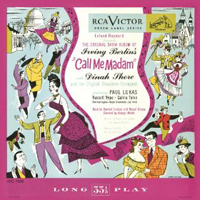 Dinah Shore With Original Broadway Cast, 1950 (RCA/Flare)
Dinah Shore With Original Broadway Cast, 1950 (RCA/Flare)  (1 / 5) After the smash-hit Annie Get Your Gun, an Ethel Merman-Irving Berlin rematch was inevitable. In Call Me Madam, once again, a real-life character inspired a musical fantasy: Mrs. Perle Mesta, an American widow known for her financial largess and lavish parties, had been a major supporter of Harry Truman and, as a reward, was appointed ambassador to Luxembourg. In the show, she became Sally Adams, ambassador to Lichtenburg. Truman remained Truman, and the Howard Lindsay-Russel Crouse script contained any number of jokes about the President’s detractors and his singing daughter Margaret. Berlin’s score is good, not great; the standout number is the bouncy duet-in-counterpoint “You’re Just in Love,” which was added late in previews. RCA backed the hit show and owned the recording rights, but Merman was under contract to the rival Decca label, so two albums emerged. RCA made theirs with Dinah Shore instead of Merman, whose Decca set is reviewed below. Neither recording is very successful. RCA gives a fuller sense of the show, with overture, choruses, and a strong supporting studio cast. Unfortunately, there’s also some lame narration to explain the plot to home audiences. Shore sings with her trademark smoothness and verve but with no theatricality; for all its sly humor, “The Washington Square Dance” sounds like a generic pop tune when she delivers it. As for Paul Lukas, with just enough singing voice to get by, he makes as suavely Continental an impression here as he did in his movie roles. Russell Nype is an ideal juvenile, neither too light-voiced and callow nor heavy-handed, and Galina Talva does very well opposite him. The recording would be a worthy memento of the show were it not for the utterly miscast singer at its center. — Richard Barrios
(1 / 5) After the smash-hit Annie Get Your Gun, an Ethel Merman-Irving Berlin rematch was inevitable. In Call Me Madam, once again, a real-life character inspired a musical fantasy: Mrs. Perle Mesta, an American widow known for her financial largess and lavish parties, had been a major supporter of Harry Truman and, as a reward, was appointed ambassador to Luxembourg. In the show, she became Sally Adams, ambassador to Lichtenburg. Truman remained Truman, and the Howard Lindsay-Russel Crouse script contained any number of jokes about the President’s detractors and his singing daughter Margaret. Berlin’s score is good, not great; the standout number is the bouncy duet-in-counterpoint “You’re Just in Love,” which was added late in previews. RCA backed the hit show and owned the recording rights, but Merman was under contract to the rival Decca label, so two albums emerged. RCA made theirs with Dinah Shore instead of Merman, whose Decca set is reviewed below. Neither recording is very successful. RCA gives a fuller sense of the show, with overture, choruses, and a strong supporting studio cast. Unfortunately, there’s also some lame narration to explain the plot to home audiences. Shore sings with her trademark smoothness and verve but with no theatricality; for all its sly humor, “The Washington Square Dance” sounds like a generic pop tune when she delivers it. As for Paul Lukas, with just enough singing voice to get by, he makes as suavely Continental an impression here as he did in his movie roles. Russell Nype is an ideal juvenile, neither too light-voiced and callow nor heavy-handed, and Galina Talva does very well opposite him. The recording would be a worthy memento of the show were it not for the utterly miscast singer at its center. — Richard Barrios
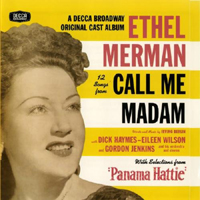 Ethel Merman With Studio Cast, 1950 (Decca/MCA)
Ethel Merman With Studio Cast, 1950 (Decca/MCA)  (1 / 5) Ethel Merman’s star quality is present in spades on this album, but the Broadway aura is gone. Neither the recording acoustic nor the arrangements add up to a worthy equivalent of a “cast album.” Even Merman sounds a tad dispirited (for her), which is understandable under the circumstances; how could theatrical magic have been created when her cohort is the bland Dick Haymes? The rest of the support is equally uninspiring and shows just how much of a make-do effort this was. In theory, the recording is essential, but in reality, it’s for completists and Mermanites only. — R.B.
(1 / 5) Ethel Merman’s star quality is present in spades on this album, but the Broadway aura is gone. Neither the recording acoustic nor the arrangements add up to a worthy equivalent of a “cast album.” Even Merman sounds a tad dispirited (for her), which is understandable under the circumstances; how could theatrical magic have been created when her cohort is the bland Dick Haymes? The rest of the support is equally uninspiring and shows just how much of a make-do effort this was. In theory, the recording is essential, but in reality, it’s for completists and Mermanites only. — R.B.
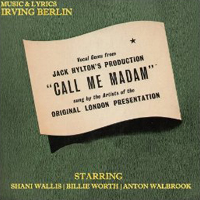 Original London Cast, 1952 (Columbia/Stage Door)
Original London Cast, 1952 (Columbia/Stage Door)  (2 / 5) Call Me Madam is so quintessentially American — one of its songs, “They Like Ike,” was later retooled by Berlin to serve as Eisenhower’s campaign song — that a successful overseas transfer might not have seemed to be in the cards. But even with a cast of mixed nationalities and no Merman in sight, the show was a hit in London. British affection for Berlin certainly helped, and so did the star. Billie Worth was a second-rank player in America, understudying Mary Martin and appearing in flops. As the London Sally Adams, she’s a delightful leading lady; if Merman’s voice suggested a trumpet, Worth’s is more like a muted cornet. Her singing is firm, her top notes ringing, her diction crisp, her mien enthusiastic. In the ballad “Marrying for Love,” her softer-grained tone is very appealing, and she holds up her end of “You’re Just in Love” nicely. Speaking of adventurous casting, Worth’s vis-a-vis is a real curio: Anton Walbrook, best known as the domineering impresario in the classic film The Red Shoes, is a suave Cosmo who does everything he can to sing as little as possible. Jeff Trent, another Yank, is nearly as good as Russell Nype; he’s partnered by the teenage Shani Wallis who, in her West End debut, sings with lovely ingenue tone and a bizarre heart-of-Transylvania accent. It’s also odd to hear “They Like Ike” with British accents. Still, on the whole, this is a worthy recording — R.B.
(2 / 5) Call Me Madam is so quintessentially American — one of its songs, “They Like Ike,” was later retooled by Berlin to serve as Eisenhower’s campaign song — that a successful overseas transfer might not have seemed to be in the cards. But even with a cast of mixed nationalities and no Merman in sight, the show was a hit in London. British affection for Berlin certainly helped, and so did the star. Billie Worth was a second-rank player in America, understudying Mary Martin and appearing in flops. As the London Sally Adams, she’s a delightful leading lady; if Merman’s voice suggested a trumpet, Worth’s is more like a muted cornet. Her singing is firm, her top notes ringing, her diction crisp, her mien enthusiastic. In the ballad “Marrying for Love,” her softer-grained tone is very appealing, and she holds up her end of “You’re Just in Love” nicely. Speaking of adventurous casting, Worth’s vis-a-vis is a real curio: Anton Walbrook, best known as the domineering impresario in the classic film The Red Shoes, is a suave Cosmo who does everything he can to sing as little as possible. Jeff Trent, another Yank, is nearly as good as Russell Nype; he’s partnered by the teenage Shani Wallis who, in her West End debut, sings with lovely ingenue tone and a bizarre heart-of-Transylvania accent. It’s also odd to hear “They Like Ike” with British accents. Still, on the whole, this is a worthy recording — R.B.
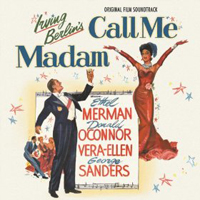 Film Soundtrack, 1953 (Decca/Hallmark)
Film Soundtrack, 1953 (Decca/Hallmark)  (3 / 5) Despite the usual deletions and toning-down that mark stage-to-silver screen transfers, Call Me Madam and its star worked well on film. In fact, the soundtrack is a far better representation of Merman in the show than the earlier Decca recording, with added vitality and Oscar-winning musical arrangements by Alfred Newman. Donald O’Connor is a splendid sidekick; his “You’re Just in Love” is a career highlight. George Sanders is the best singer of all the Continental actors who ever played Cosmo, and Carole Richards (dubbing for Vera-Ellen) is an acceptable Maria. The recording consists mostly of tracks by Merman, in top form. “The Washington Square Dance” is gone and “Something to Dance About” has been shifted to the O’Connor/Richards team, but compensation comes with a 1913 Berlin interpolation, “International Rag,” that’s as well suited to the star as anything else in the score. (A new Cold War lyric was added for the occasion.) Some people felt that Merman was too big for the movies, but here, the fit was just right. — R.B.
(3 / 5) Despite the usual deletions and toning-down that mark stage-to-silver screen transfers, Call Me Madam and its star worked well on film. In fact, the soundtrack is a far better representation of Merman in the show than the earlier Decca recording, with added vitality and Oscar-winning musical arrangements by Alfred Newman. Donald O’Connor is a splendid sidekick; his “You’re Just in Love” is a career highlight. George Sanders is the best singer of all the Continental actors who ever played Cosmo, and Carole Richards (dubbing for Vera-Ellen) is an acceptable Maria. The recording consists mostly of tracks by Merman, in top form. “The Washington Square Dance” is gone and “Something to Dance About” has been shifted to the O’Connor/Richards team, but compensation comes with a 1913 Berlin interpolation, “International Rag,” that’s as well suited to the star as anything else in the score. (A new Cold War lyric was added for the occasion.) Some people felt that Merman was too big for the movies, but here, the fit was just right. — R.B.
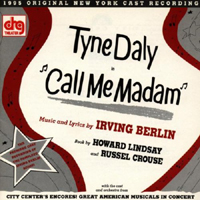 Encores! Cast, 1995 (DRG)
Encores! Cast, 1995 (DRG)  (2 / 5) A great thing about the New York theater is that the sheer number of producers and available artists allows for both new musicals and revivals of all sorts. Some producing organizations are devoted to bringing back older properties, and none has done so more dynamically than City Center Encores! Having said that, the series’ presentation of Call Me Madam was not one of its best efforts. Sally Adams was played by Tyne Daly, who sounds oddly at sea on this recording. An intelligent and incisive actress, she tries too hard to “characterize” Sally with frontier inflections and a self-consciously hearty manner. Without the compensation of a strong singing voice, this quickly becomes tiring. Rob Fisher and his Coffee Club Orchestra play the score with a good deal of spirit, but while the remainder of the cast is adequate, no one makes a great impression; even Melissa Errico, whose later performance in One Touch of Venus was an Encores! high point, sounds correct rather than distinctive. — R.B.
(2 / 5) A great thing about the New York theater is that the sheer number of producers and available artists allows for both new musicals and revivals of all sorts. Some producing organizations are devoted to bringing back older properties, and none has done so more dynamically than City Center Encores! Having said that, the series’ presentation of Call Me Madam was not one of its best efforts. Sally Adams was played by Tyne Daly, who sounds oddly at sea on this recording. An intelligent and incisive actress, she tries too hard to “characterize” Sally with frontier inflections and a self-consciously hearty manner. Without the compensation of a strong singing voice, this quickly becomes tiring. Rob Fisher and his Coffee Club Orchestra play the score with a good deal of spirit, but while the remainder of the cast is adequate, no one makes a great impression; even Melissa Errico, whose later performance in One Touch of Venus was an Encores! high point, sounds correct rather than distinctive. — R.B.

